#but given the time and resources i think i could make so many different diverse perfectly average to good things
Text
it's really a shame I have to sell 40+ of my life hours every week for poverty wages instead of spending all my time and energy on dozens of creative and technical pursuits with unlimited resources
#nerd alert#lets see if i can list all the hobbies i wish i could be doing instead of working#drawing. both traditional and digital. painting mostly acrylic but id like to get good at watercolors. drawing/writing comics#writing in general. fiction nonfiction poetry lyrics whatever. composing music. music production. singing. practicing piano and guitar#performing someday maybe!#sculpting too. i always forget bc i never do it bc i am never in a place to justify buying clay. i should just get some#i think im fairly good at it tbh. anyway.#knitting. sewing. mending and modding clothes in general. embroidery. id like to learn to crochet at some point#photography and scrapbooking sound appealing. photo editing.#web design. game design. 3d modeling. these are all things i dont really know how to do much of but id like to#animation. voice acting. regular acting. honestly a lot of stuff in the filmmaking process sounds fascinating id like to try some of it#tarot reading. is that a hobby? im gonna say yes. jewelry making.#lots of these ive only dabbled in and some i havent even done that but would like to. but i have no time and or money to get into them.#i would hardly call myself a master at any of these. jack of all trades as it were. and thats fine im fine w that#but given the time and resources i think i could make so many different diverse perfectly average to good things#that people could enjoy in passing or say 'oh how neat :)' about
18 notes
·
View notes
Text
Currently compiling all of my personal headcanons for Vulcans in campfire so I can try to keep my fic stuff consistent and hrrgasdg I loveeeeee worldbuilding. Is any of this #realscience? nope. Is it still cool as fuck? Yep.
I'm not saying that biology is a special interest of mine, but I am saying that I did in fact make a flowchart of how I think Vulcans evolved into being humaoids from ocean bugs. Spoiler its by using desert cats as the mammal instead of apes. totally not because Vulcans are catboys or anything
I've even made separate evolutionary adaptations depending on what part of the supercontinent the Vulcans are from, like there are polar ice caps and so I've made flora and fauna that are kind of consistent with earth arctic stuff but also different and weird to accommodate for the desert conditions. (Yes ice is still classed as desert)
idk in my head Vulcans had a muchhh longer time period of being upright brain kinda work beings than we did because the climate was so harsh that evolution couldn't be as rapid + the whole fighting each other to death bit
Also those motherfuckers have tattoos and piercings and other illogical body mods, you're telling me that those pre-surak bitches wrote the most kick ass poetry and wouldn't?? ink themselves up with it?? yeah sure bud. Also sooo much socitial emphasis on jewelery and having either tattoo designs and stuff passed down through generations like taonga.
The level of drip Vulcans have is already illogical, idk I just think that most Vulcans who go offworld are taught to censor their cultural aspects in order to be less 'offensive' (appeal to space racists) but that the majority of regular ass Vuclans continue to practice their culture as their Surak given right.
Bc Uhura is my bbg and she's in all my tos fic (duh) I've also made some preliminarily language stuff (no dictionaries or anything) on potential communication things for the different regions depending on their available resources. e.g sign languages that require touching another person for dust storms/ blizzards.
'Cause of my physically disabled ass is in control here I've also been looking at how a semi-utopia view of accessible architecture could work while also tryna balance out the whole logical eugenics thing, too many cool sci-fi settings have like massive stairs and I'm like. :/ rlly.
When I do my ds9 fic stuff once the tos brainrot has abated I'll probably do a similar thing for Cardassians and Ferengi and Trill and all the other cool little critters.
I just think that Star Trek does WAYYYY to little with the ideas of alien cultures and ends up summeriasing entire planets and believing the same things and generalyl being copies of each other when there is so much diversity? across biomes? let alone galaxies. Semi-related it's like how obvs tos are my blorbos but I really want a new series which is just like "oh yeah this is Mr Brep and she kisses ladies and is also a spy for the Heebie Jeebie goverment and keeps getting into hijinks with her friends who she holds hands with all the time."
most of the time I wish I was normal and liked by my peers but other times, having autism kinda slaps.
#star trek#tos#worldbuilding#fanfic writing#autistic special intrests#In order to make their biology make more sense Vulcan has massive cave systems that provided shelter pre-smart times and also function as#ground water which is how they can afford to have that much water in their bodies#Also! instead of papyrus being the source of paper they used a native fungi that grows in those caves#also architecture??? I loveeee making shit up for different weather conditions#UGH THE MAGLEV TRAINS TOO FHADSFASDFAS#vulcans#vulcan biology#vulcan worldbuilding
15 notes
·
View notes
Note
For reals though, how would you improve the church in a more socialistic and queer friendly manner? (Answer cannot involve defenestration)
So, to get the church to a more progressive place would be a tall order. So I’m not gonna aim for “socialistic” quite yet, at least at first. Rather, I would first want to lay the groundwork for more radically progressive things in the future, while making some changes that should have taken place already. These include, in no particular order:
Allowing for gay marriage and full participation in the church for trans folks: perhaps the most radical change on the list, and the most needed.
De-emphasize the idea of eternal marriage, and expand the idea of what eternal family is: Essential for aro/ace people, and goes hand in hand with the first one
Apologize for past wrongs: This includes doctrines such as the priesthood/temple ban for black members, past and current colonialism, and the current practices of LGBTQ exclusion from church ordinances and participation.
Give every worthy member the opportunity to have the priesthood: Also needed to make the church less patriarchal. This would hopefully lead to more diverse leadership in time
Get rid of the idea of “unchanging truth”: This hurts us more often than not, and leads us to defend ideas that are harmful. Better to be committed to focusing on all the “many great and important things” God has “yet to reveal.”
Developing and spreading a unique mormon theology: We need some ideas and thinkers to be popularized that are more uniquely weird and Mormon. People like Patrick Q. Mason, Fiona and Terryl Givens, and Adam S. Miller come to mind, and I am sure there are many more. We cannot be content to crib notes from evangelical Christianity.
Get inspired by other faith traditions: Idk, Mormons could really stand to gain inspiration from Judaism, Islam, Buddhism, etc. I mean, we do believe that most if not all religions have truth in them, and we should do more as a church (and as a culture of individuals) to seek to learn from other religions.
Keep encouraging reliance and interdependence, but stop defending capitalism: Mormons being thrifty and resourceful is good. Just not when they’re encouraged to treat capitalism like a nigh spiritual doctrine. Stop it.
Get rid of the American Exceptionalism: This speaks for itself.
Really embrace the Book of Mormon: A lot of the power of the BoM goes untapped, I think. The BoM is a document about how to be a Christian when the world crumbles around you, how to have faith in Christ in a faithless and hopeless world. It describes in detail the evils of xenophobia and fascism and class division, and tells us that while a better world is possible, we must never be complacent, lest division arises and plunges us into chaos. It is a book of religion unlike any other, and while our reliance on the D&C is important, I think we cannot be content in thinking that simply having the BoM makes us different from other Christian faiths. We have to look at what about the BoM is different compared to what came before in order to be truly Mormon.
Focus more on Christ and his love and forgiveness and grace and mercy: Please for the love of God we don’t have nearly enough of that, as much as Mormon weirdness is great, we often get lost in the esoteric weeds and miss the forest for the trees. Bring it all back to Christ please and thank you
More tolerance for those who leave: This speaks for itself. Mormons tend to get too defensive about their faith, and are scared and intimidated by people who decide it is not for them, in part or in full. We should do more to listen to them and be welcoming to them without trying to force them to return.
Change the focus of missionary work from proselyting to service: Some good strides have happened here with the introduction of service missions, but to me, I think all missions should be service first and proselyting second. And we need to be a lot less door to door salesy. It’s creepy and a bit manipulative a lot.
Let us say Mormon again: Nelson, buddy, the devil ain’t laughing at us. But a lot of people are laughing at you for this one, bucko.
So yeah. Not a conclusive list, but some helpful first steps to make progress down the line, hopefully. Thats how I would start I think.
37 notes
·
View notes
Note
Any tips for making arab/indian oc?
Personally, I don't think I'm the best person to ask this given I'm neither Arab nor Indian but here are some good tips I think anyone looking into such endeavors should know-
1. Avoid Orientalist Tropes
How timely! But avoid tropes that stress the “foreign-ness” and “exoticism” of your arab and indian ocs, especially ones that deal with sexuality and sensuality, as sexual stereotypes of MENASA (Middle East North Africa South Asia) men and women are very pernicous and harmful. There’s a lot of tropes I could go into, but I’ll link to this excellent WritingWithColor post here and here that also links to additional resources!
2. Arab /= Muslim and Indian /= Hindu
There’s so many minority populations that exist in the Middle East and South Asia that practice a wide variety of faiths (and even within the dominant religion there’s so much diversity in culture and practice) so you really shouldn’t automatically equate entire ethnicities with religion. (I’m like. skipping out a lot on the politics of ethnic identity and religion in specifically the middle east so forgive me haha)
(I would also advise you to not try to put your religion hot takes in ur characters and stories esp if ur not really familiar with the religion in question dsjkfjkdskj)
On a similar note, get specific with your ocs’ identities! Researching a specific region and time period’s culture will help you avoid a generic, orientalist stereotype of vaguely MENASA inspired regions.
3. Treat them like normal people
Okay, this is both informed by my experience as an East Asian as well as an extension of the first tip, but please bear in mind not all of my experiences of orientalism can be transplanted onto MENASA experiences of orientalism.
So, I find myself really uncomfortable when people describe some aspect of “East Asian culture” as “so exotic” or “completely incomprehensible” (esp in cases where they’re trying to say easians are easily submissive to authority/prone to authoritarianism) to westerners.
It’s true that we have cultural differences, but we’re still people at the end of the day, and you should really avoid language and tropes that others/exotifies us or stress our differences from “normal people.” You should apply this advice to Arab and Indian characters, making them complicated, fully realized people, as well as avoiding making wide, generalizing statements about entire groups.
These are only the tips I had off the top of my head, so if any Arab and Indian people want to chime in, please do!
52 notes
·
View notes
Text
Supergirl/Supercop Fandom/Canon Things
Today, let's talk about some (odd?) things, that appear in the SG/SC fandom/fanfics.
[This is gonna be another long post, lotsa images/gifs, and I own nothing. Please be fair, I am aware it is all just fiction and I am just having a good time myself here. I do not mean to offend, but to share my thoughts and to entertain. I also acknowledge the lore/canon can be contradicting, but I tried to present the most agreed upon consensus on the below.]
- Kara sweats (like a human) ..?

...dude, girl can catch on fire and not feel it. 😑
Outside of greenK or red sun exposure... she didn't even sweat from physical taxation when she stopped that space-freighter or fought Reign.

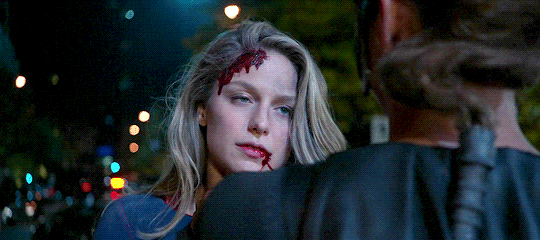
That's not to say she can't sweat... given the right kind of exhaustion >.>
- Kara needs a lot of calories ..?
In 1x18 Barry Allen (meta-human) said, he needs to eat for upkeep (“About 10,000 calories per day”). At which Winn replied: "Oh, yeah. You've definitely met the right girl." referring to Kara.
And I think, that's where this misunderstanding comes from...
...Kara likes to eat. She does not need to eat.
Kryptonians under a yellow sun can sustain their upkeep from the yellow sun radiation alone. Less fun, tho.
It's also where the idea for this came from, somehow:
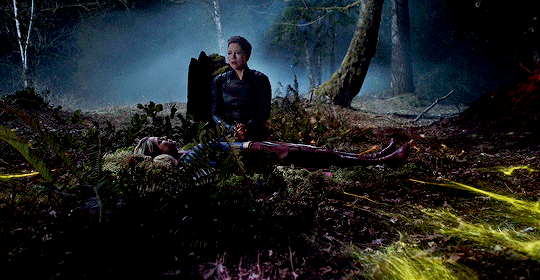
The argument could be made, that like many/some of her other senses Kara's sense of taste is more enhanced (that or original Kryptonian cuisine tasted really bland, which may or not be related to the planet not having much diversity to offer in the years/decades/centuries(?) before its destruction).
So, everything just tastes really good to her (except greens).
That and she probably just burns her intake away (as her sun radiation based metabolism may be that much more energy rich, which makes me agree with Kara having a generally higher body temperature), so she wouldn't gain weight.

Note: it's not the sunlight but the sun's radiation. Which permeates and lingers and hence Kara doesn’t need direct sun-exposure, and won’t drain her energy on rainy days. This sort of metabolism is called "radiosynthesis". (An Earth equivalent would not be a plant, but a radiotrophic fungus, as found at the Chernobyl Nuclear Power Plant.)

- Red sun radiation (or the absence of a yellow sun) immediately makes Kara weak ..?
(CWSG depicted that one wrong or at least not quite right on several occasions - taking the consensus of some 80 years of Superman / Kryptonian lore into account, SGCW imo does not win this round)
...Kryptonians are rather often likened to batteries, in the way they absorb sunlight radiation to charge them. That is why Kara isn't powerless at night or underground.
Various forms of Kryptonite disrupt this biochemical(?) procedure and either actively drain the Kryptonian's cell / cancel out the stored sun radiation or the counter-healing from the Kryptonite poisoning sap away the energy resources (sources are unclear on that). Red sunlight radiation offers merely a different / lower energy yield for Kryptonians.
On a planet with a red sun (or in darkness, or any other yellow sunless environment) a Kryptonian's power would reduce slowly as they expend it. The longer they are subjected to a red sun and the more energy they exert, the more diminished their powers become until they completely lose all their abilities and benefits from yellow sun radiation..
This (slow, or forced through power exertion - e.g. solar flaring) drainage also means, that Kara would need a yellow sunlight radiation source to replenish herself after prolonged red sunlight exposure to regain her powers.
...tying this in with the point before, their red sun Rao did not radiate as much or lesser energy, hence Kryptonians on Krypton (additionally to sunbathing?) or prolonged other red sun location dwelling / yellow sun deprivation naturally need to eat.
On that note:
- RedKryptonite =/= red sunlight (lamps)
One makes for an uninhibited (easily pissed off) Kryptonian, two does not (re-)charge their cells for powers.
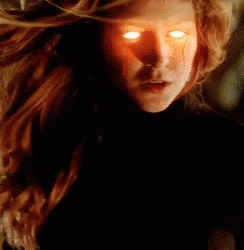
- Lena aimed greenK cannons at Kara in 5x08 ..?
While that may have been Kara's (and Alex's) perception, the "Counter Measures" had been programmed by Lex and automatically started up when “Kryptonian X-Ray Vision” was detected.
When Eve asked Lena whether or not to deploy them, Lena (hesitantly) said yes to the "Ion Rays Cannon".
When Kara basically shrugged those off, the cannons rearmed themselves with Kryptonite and Lena IMMEDIATELY ordered Eve to cancel them, to "Shut them down! Now!!".
Lena got mad when Eve couldn't overwrite the protocol and pushed Eve aside to do it herself and breathed a deep sigh of relief when she managed to disarm them, barely in time.
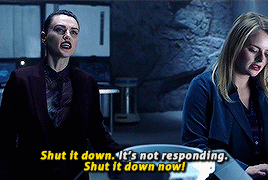
...
...trapping Kara with the Fortress' own (apparently pre-installed... we shall not kink-shame Kal!) greenK cage: Yes, that she did.
But, realistically, how else was Lena, a mere human with a (very mislead) plan, to gain a headstart over a Kryptonian?
While rude (and undeniably painful), the intensity apparently wasn't even set high enough to bring Kara down to her knees and there was a reasonable chance J'onn or someone else would rather sooner than later come and free Kara.
(Let's not forget, the DEO used and had more plans to take down / contain a Kryptonian, and more than once Kara herself - the very pilot episode even! - and we forgave both J'onn and Alex.)
- Lena is afraid of heights ..?
Might be a misinterpretation... Or true. I can’t really tell... But was never actually canonically stated.
In 2x01 Lena tells her helicopter pilot “I hate flying, I know statistically it's the safest way to travel, but still”. Almost crashing less than a minute later may not have helped her aversion. She did not seem physically tense during take-off before that.
Later on she is shown to neither mind casually standing on her balconies (even after being thrown off one) nor being carried by Kara.

And let's not forget this leap of faith:

...I also share the growing suspicion that Lena's fear of "traveling through air" may either be limited to non-Kara flights or possibly even have been cured at some point...

((On a sadder note, it's reasonable to assume, that Lena's aversion to (plane) flying may be due to her 4-year old self being dragged onto a plane right after she lost her mother, when she was taken from NFL Ireland to the US and before she got dropped by a complete stranger (Lionel) into a cold unwelcoming household, hence she may have come to associate flying with fear, abandonment, loss of control and uncertainty. And in part to regain some of that control she later in life got herself a piloting license.))
Fun fact:
Kara being portrayed as physically stronger than Kal-El in CWSG is actually lore-related (and kinda sorta maybe -pseudo- scientific).
Across most of the lore, Krypton was much larger than Earth, therefore had far greater gravity. Kryptonians had evolved to withstand that.
Even without powers, Kal's physiology/genetics would still make him stronger and more durable than any human. But, Kal was a baby and grew up on Earth. Kara was already a teenager, and her bones and muscle tissue (and her cardio-pulmanory system) developed stronger and more robust under that greater gravity, while Kal's most likely adapted to "only" withstand Earth's gravity (but then solar radiation, so he's still a Super) .
So, instead of it being the magic of "girl power", Kara having been old/matured enough to witness and remember her planet's destruction for once gave her a benefit...

It can also be argued, that Kara being at the verge of physical adolescence resulted in her body having had to "make due" with red sun radiation in its "informative" stages, and hence once on Earth, the yellow sun radiation affected her more (for the rest of her life).
Or the counterargument could be made, that this is false as Kal had more time on Earth, with his body developing subjected to yellow sun radiation, adapting more efficiently to it, that he should, in fact, be naturally stronger...
Still, Kryptonians do not necessarily have to be "heavier" than humans. If their cells have (evolved to have) a different structure, they could be stronger, more durable, more energy efficient and sturdier without being heavier (like 3D graphene materials, where an (artificial) particular geometric arrangement makes the (naturally) brittle material that much stronger, but with bio-matter/cells. Add more energy (solar radiation) and with that (electro-)magnetism into the mix and we may pseudo-science our way into explaining how Kryptonians become next to invulnerable on Earth.)
How Kara broke her arm from a mere fall that easily after she solar-flared is actually - dare I say - unrealistic... but, alas, CWSG.
...unless the CWSG writers went the route of this one older and weird explanation of why Kryptonians can fly, which basically says “Kryptonians have hollow bones, like birds. That’s why they can fly.” ... 😧...🤣(Yes, like that. No more, no wings or anything, just their bones are like birds’ and that’s why! ...like I said, the Super-lore is some 80 years old...)
All that said, yes, in AUs technically everything goes.
But, some things can actually be just as if not more fun, without ignoring canon or long standing lore... Maybe?
(Admittedly, the Superman and hence Kryptonian and Supergirl lore undergoes constant changes over the decades - mostly for the better, though, making more and more “scientific” sense. Yet, even within the run of CWSG there were some blatant contradictions. And... just, let's not talk about Crisis.)
I mean no harm and I also enjoy fics that chose a different take on the above mentioned.
I hope, though, this helps one or the other and may even inspire some.
Feel free to ignore anything or everything, though. I am not your boss :P
Stay safe!
Kue out.
#supergirl#supercorp#fandom#fandom fun#fanfics#pseudo-science#comic books#DCSG#Kue doing Kue-things#long post#none of the pics or gifs are mine
35 notes
·
View notes
Note
Howdy, I got curious about red junglefowl and read a breed profile which said they are good layers, laying around 250 eggs a year. Now, I've animal welfare folks say that laying breeds' bodies go under a lot of stress and have shortened lifespans, as laying near every day outside of winter is unnatural to them and a product of domestication. I've even seen animal rights people say that they believe laying breeds' should be given hormonal implants to stop egg production. I more or less took that as truth (the stress part, not that they need implants). Now I'm confused, is that wrong? Do undomesticated red junglefowl lay near as many eggs as domesticated chickens naturally?! Or was that article incorrect?
Those articles usually dont really know what they are talking about especially when it comes to wild fowl.
Red jungle fowl are a wild bird and do not lay that many eggs. Im sure some "strains/lines" that have been mixed with bantams and leghorns could definitely lay a high number of eggs but pure wild jungle fowl have a breeding season and the hens tend to lay a clutch then they sit. Some people can get them to lay more by taking the eggs but it really depends on how healthy the birds are and only people with really healthy birds and good enclosures (not coop, ENCLOSURE) are the ones that i have seen that are able to actually get a decent number of eggs and even then i think its more so in the 20-50 range which is still an impressive number if you think about it.
Sometimes AI write those articles and technically domesticated chickens are just the domesticated form of the red jungle fowl, in some definitions and cultures they arent even seperated and are considered one in the same so its easy for someone or a bot to make the mistake of think a normal red jungle fowl could lay the same as a leghorn hen if they are looking for information they can just copy paste. It doesnt help a lot of research and studies comparing the two species use leghorns as the domestic stand in lol so id imagine it would be easy to misremember, then that articles information keeps being shared like its fact. During the breeding season a wild jungle fowl hen in human care can definitely lay an egg quite often as their bodies are made to produce lots of eggs in times of plenty because they have those extra resources.
That being said i do not advocate for the keeping or breeding of the wild red jungle fowl. A lot of jungle fowl are losing their genetic diversity due to being interbred with chickens both feral and on purpose. They are not a breed but a species.
Production hens do have a lot of welfare concerns as they are not bred for longevity as the egg industry only keeps them around for 2 years max so they are pushed for more and more production which leads to high instances of reproductive cancer and infection. It is rare for a production hen to go broody and they sometimes will keep laying even in low light conditions like winter. This puts a huge stress on their bodies. Greenie for example has to be on the laying implant or she will die, her oviduct gets inflamed and she starts developing fluid build up which left unchecked would cause organ failure. This is very different then my other breeds which do not lay daily and also go broody which gives their body a break and of course they slow down laying in the winter. Its why production breeds have such a short lifespan compared to heritage breeds. Even Heritage Leghorns tend live a lot longer then production ones because they are not selected for extreme egg laying.
So i would say just take alot of internet articles, especially ones that are right there at the top of the search results with a grain of salt. Im pretty sure i know what article you are talking about and i found it quite silly when i read it to.
21 notes
·
View notes
Text

3. Jack & Mayka
Conservationist & Linguist
Photographed by Matt Horwood
Tell us something about yourself that nobody else knows.
Mayka: Before reading a new book I always read its very last page just before I start from the beginning. And, in case you were wondering, I've never been less surprised by the ending. By the time I get to the end I've already forgotten what I've read!
Jack: I’m a pretty open person, so there’s not a lot people don’t know, but maybe… I occasionally eat raw garlic while preparing dinner, apparently it’s good for you!
What do you enjoy doing in your own time?
Jack: My main hobby is wildlife watching, with a focus on birds. I love to spend the day out on a new reserve and see what wonderful creatures live there. On a rainy day you’ll usually find me inside playing punishingly difficult video games.
Mayka: In my free time I usually do various things including; going for a walk in the countryside, spending time with friends... etc. But occasionally when inspiration strikes I love sketching and painting beautiful creatures. Especially beetles.
Tell us a bit about where you are from and what impact where you grew up had on you.
Mayka: I am from a tiny isolated mountain village in the south of Spain. I grew up surrounded by nature which allowed me to understand the importance of what earth has to offer in a very intimate way. I am not only talking about food and other resources but also activities and lifestyle. My vision of the 'modern' world is full of wonder, I remember the first time I went in a lift!!
Jack: I grew up in a semi rural part of North Wales, so have grown up surrounded by natural beauty. Growing up around such easily accessible natural splendour has given me the start I needed to get into nature-watching as a full time interest.
If you had to pick one thing, what are you most passionate about?Jack: Seeing new animals, I love experiencing a behaviour or action from an animal I’ve never seen before, be that the hoot of an owl, or a grass snake swimming across a pond. I believe there is so much value in the observation of the natural world, both for science and personal well-being.
Mayka: Having studied Translation I've developed a great passion for not only languages but also different cultures. For that reason one of my greatest challenges in life is to influence people around me and make them reflect about the importance of cultural awareness and diversity.
What makes you angry?
Mayka: Once again, having a background in languages and communication, I find particularly infuriating when issues are not addressed properly due to the fear of sounding politically incorrect. I read somewhere that what is not talked about does not exist... and I wish there were more accurate ways of talking about and describing social issues such as male violence against women.
Jack: The destruction and over exploitation of the natural world around us. It angers me to think of the sheer abundance and diversity of wildlife the world and more specifically the UK, used to hold, and the reasons that it’s not like that anymore.
If you could change one thing about the world, what would it be?Jack: Easy! More wildlife, more land given over to the protection of species, more money and thought put towards causes that help relieve biodiversity loss.
Mayka: I am a fervent believer in the importance of education as a means to tackle many (if not all) of the world's inherently social problems. Including the impact these problems have on the environment.
Do you feel connected to nature and/or wildlife and if so, tell us a bit about when you first found an interest or felt connected.
Mayka: I feel connected to nature since as long as I can remember. One of my first memories is digging out a nest of worms with my bare foot in an attempt to climb up a little hill just by my parents' house. Not the most popular creature but I have always been drawn to invertebrates. They are just so different to us mammals.
Jack: I definitely feel connected to nature, and I have been from a young age. My mother always encouraged my interest in animals when I was a child by finding me biological field guides (‘I used to just look at the pictures). One strong memory I have is visiting RSPB Conwy as a child and being encouraged to find ‘mini beasts’ by one of the volunteers. After finding a ladybird the volunteer explained it’s life cycle and how it fits into an ecosystem and it’s importance to other organisms.
***
Dywedwch rywbeth amdanoch eich hun nad oes neb arall yn ei wybod.
Mayka: Cyn darllen llyfr newydd rydw i bob amser yn darllen ei dudalen olaf un cyn i mi ddechrau o'r dechrau. A, rhag ofn eich bod chi'n pendroni, dwi erioed wedi synnu cymaint gan y diweddglo. Erbyn i mi gyrraedd y diwedd dwi wedi anghofio be dwi wedi darllen yn barod!
Jack: Dwi’n berson reit agored, felly does dim llawer o bobl ddim yn gwybod, ond falle… dwi’n bwyta garlleg amrwd o bryd i’w gilydd wrth baratoi swper, mae’n debyg ei fod yn dda i chi!
Beth ydych chi'n mwynhau ei wneud yn eich amser eich hun?
Jack: Fy mhrif hobi yw gwylio bywyd gwyllt, gyda ffocws ar adar. Rwyf wrth fy modd yn treulio'r diwrnod allan ar warchodfa newydd a gweld pa greaduriaid hyfryd sy'n byw yno. Ar ddiwrnod glawog byddwch fel arfer yn dod o hyd i mi y tu mewn yn chwarae gemau fideo anodd iawn.
Mayka: Yn fy amser rhydd rydw i fel arfer yn gwneud pethau amrywiol gan gynnwys; mynd am dro yng nghefn gwlad, treulio amser gyda ffrindiau… ac ati. Yn enwedig chwilod.
Dywedwch ychydig wrthym am o ble rydych chi'n dod a pha effaith gafodd lle cawsoch eich magu arnoch chi.
Mayka: Rwy'n dod o bentref mynyddig bychan yn ne Sbaen. Cefais fy magu wedi fy amgylchynu gan natur a oedd yn caniatáu i mi ddeall pwysigrwydd yr hyn sydd gan ddaear i'w gynnig mewn ffordd agos iawn. Nid yn unig yr wyf yn sôn am fwyd ac adnoddau eraill ond hefyd am weithgareddau a ffordd o fyw. Mae fy ngweledigaeth o'r byd 'modern' yn llawn rhyfeddod, dwi'n cofio'r tro cyntaf i mi fynd mewn lifft!!
Jack: Cefais fy magu mewn rhan lled wledig o Ogledd Cymru, felly rwyf wedi tyfu i fyny wedi fy amgylchynu gan harddwch naturiol. Mae tyfu i fyny o gwmpas y fath ysblander naturiol hygyrch wedi rhoi'r cychwyn yr oedd ei angen arnaf i fynd i mewn i wylio natur fel diddordeb llawn amser.
Pe bai'n rhaid i chi ddewis un peth, beth ydych chi'n angerddol amdano fwyaf?
Jack: Wrth weld anifeiliaid newydd, rydw i wrth fy modd yn profi ymddygiad neu weithred gan anifail nad ydw i erioed wedi’i weld o’r blaen, boed yn hŵt tylluan, neu’n neidr laswellt yn nofio ar draws pwll. Rwy’n credu bod cymaint o werth mewn arsylwi’r byd naturiol, o ran gwyddoniaeth a lles personol.
Mayka: Ar ôl astudio Cyfieithu rydw i wedi datblygu angerdd mawr nid yn unig at ieithoedd ond hefyd am ddiwylliannau gwahanol. Am y rheswm hwnnw un o fy heriau mwyaf mewn bywyd yw dylanwadu ar bobl o'm cwmpas a gwneud iddynt fyfyrio am bwysigrwydd ymwybyddiaeth ddiwylliannol ac amrywiaeth.
Beth sy'n eich gwylltio?
Mayka: Unwaith eto, gyda chefndir mewn ieithoedd a chyfathrebu, mae'n gynhyrfus iawn pan nad yw materion yn cael sylw priodol oherwydd yr ofn o swnio'n wleidyddol anghywir. Darllenais yn rhywle nad yw'r hyn na sonnir amdano yn bodoli… a hoffwn pe bai ffyrdd mwy cywir o drafod a gwahaniaethu ar faterion cymdeithasol megis trais gwrywaidd yn erbyn menywod.
Jack: Dinistrio a gor-fanteisio ar y byd naturiol o'n cwmpas. Mae’n fy nghythruddo i feddwl am y doreth ac amrywiaeth o fywyd gwyllt y byd ac yn fwy penodol y DU, a arferai ddal, a’r rhesymau pam nad felly y mae bellach.
Pe gallech chi newid un peth am y byd, beth fyddai hwnnw?
Jack: Hawdd! Mwy o fywyd gwyllt, mwy o dir yn cael ei roi i warchod rhywogaethau, mwy o arian a meddwl tuag at achosion sy'n helpu i leddfu colli bioamrywiaeth.
Mayka: Rwy'n gredwr brwd ym mhwysigrwydd addysg fel ffordd o fynd i'r afael â llawer (os nad y cyfan) o broblemau cynhenid gymdeithasol y byd. Gan gynnwys yr effaith a gaiff y problemau hyn ar yr amgylchedd.
Ydych chi'n teimlo'n gysylltiedig â natur a/neu fywyd gwyllt ac os felly, dywedwch ychydig wrthym am bryd y daethoch o hyd i ddiddordeb gyntaf neu pan wnaethoch deimlo cysylltiad.
Mayka: Rwy'n teimlo'n gysylltiedig â natur ers cyn belled ag y gallaf gofio. Un o fy atgofion cyntaf yw cloddio nyth o fwydod gyda fy nhroed noeth mewn ymgais i ddringo i fyny bryn bach ger tŷ fy rhieni. Nid y creadur mwyaf poblogaidd ond rwyf bob amser wedi cael fy nhynnu at infertebratau. Maen nhw mor wahanol i ni mamaliaid.
Jack: Rwy'n bendant yn teimlo'n gysylltiedig â natur, ac rwyf wedi bod ers yn ifanc iawn. Roedd fy mam bob amser yn annog fy niddordeb mewn anifeiliaid pan oeddwn yn blentyn trwy ddod o hyd i ganllawiau maes biolegol i mi (‘Roeddwn i’n arfer edrych ar y lluniau yn unig). Un atgof cryf sydd gennyf yw ymweld ag RSPB Conwy yn blentyn a chael fy annog i ddod o hyd i ‘bwystfilod bach’ gan un o’r gwirfoddolwyr. Ar ôl dod o hyd i fuwch goch gota esboniodd y gwirfoddolwr ei gylch bywyd a sut mae’n ffitio i mewn i ecosystem a’i bwysigrwydd i organebau eraill.
#WALES#NATURE#PHOTOGRAPHY#PHOTOOFTHEDAY#ART#LOVE#WILDLIFE#WILDLIFEPHOTOGRAPHY#FASHION#NATUREPHOTOGRAPHY#HOLIDAY#AUTUMN#WILD#SEA#AMAZING#PHOTOGRAPH#EYES#TRAVEL#BEAUTY#WATER#LANDSCAPE#TIPS#OUTDOORS#MONDAYMOTIVATION#MONDAY#BLOG#LIFESTYLE#DANCE#ACTOR#FILM
1 note
·
View note
Text
The Scientific Evidence Behind Creativity and Exercise (and Free Ways to Get Moving at Home)
We've all struggled with writing block before and will definitely face it again in the future. What happens when your old tricks don't solve the problem?
I've found some success in adding exercise to my weekly routine.
Hear me out—I do not have a gym membership. I don't exercise every day. I don't even think about lifting weights.
I walk.
That's it. If my writing gets stuck and I'm at a loss, I walk around my neighborhood. I used to walk around my old apartment community too. Before that, it was my college campus.
How Does Exercise Improve Your Creativity?
You don't need to invest in a yoga mat or a weight set to benefit from a little extra movement in your creative life.
Let's look at some scientific proof.
Research shows that when elementary school students participated in aerobic activities for 45 minutes every day, they demonstrated significant improvements in their creative activities right afterward. Those were measured by variables in their drawings like image originality, title originality, and the amount of details within their drawings.
You can also check out this study on adults, which was a randomized controlled experiment. The creativity per participant regarding their number of original ideas and details within each idea increased after three 15-minute sessions of walking (although the difference wasn't significant because the study was such a limited, short-term experiment).
There's also this scholarly article on a study involving people with dementia. Walking greatly improved the participants' cognitive creativity compared to when they were given the same activities prior to their exercise.
Free Ways to Get Moving at Home
So we know walking can strengthen your creative skills, but what if walking isn't an option? You might be one of the many people without that much free time in their schedule. You could also live somewhere that makes you feel uncomfortable walking alone.
There are tons of free ways to get moving right inside of your home. Check out a few of these resources if you haven't tried them.
Free Fitness Websites
PopSugar Fitness: PopSugar updates the Fitness section of their website with articles that cover indoor workouts of all types. They also outline if any of the workouts require equipment and what you can swap for expensive supplies.
DAREBEE: if downloading and printing workout guides is more your style, check out DAREBEE. It's a non-profit organization that posts fitness resources on their site regularly. Everything's ready to print and of course, usable online too.
Exercise.com: not sure where to start? Exercise.com has numerous types of workouts ready to start at home. There are a few features locked behind a membership fee, but almost everything is available to the public.
mindbodygreen: the people behind mindbodygreen believe that exercise should never compromise your mental health. All of their free workouts can easily adapt to your abilities and resources. They also only require a few minutes of your time.
MyFitnessPal: MyFitnessPal's website updates weekly with articles covering workouts and workout tips. *Please note that the site also has a focus on weight loss, which could be triggering for some people.*
Free Fitness YouTube Channels
Blogilates: I've used Blogilates off and on for years. All of the videos are free and new, quick pilates workouts hit the channel weekly. The vibe is upbeat and positive, which is great when I'm being too hard on myself for getting stuck in a mental block.
Chloe Ting: many of my friends use Chloe Ting's videos to exercise in between virtual work meetings and during their lunch breaks. She has pilates videos that are more music focused.
Healthy With Kelsey: Kelsey focuses on body positive fitness that is all about feeling great in your skin without a weight loss or muscle gain goal. Her videos include HIIT workouts, weight lifting, cardio and mini weekly series if you like a challenge.
Diverse Personal Training: Natasha Clapp is a personal trainer who wants people of all body types to enjoy getting active. You could get your heart rate up by dancing along with her wheelchair-friendly dance parties and gentle stretching routines.
The Fitness Marshall: Caleb Marshall choreographs dances to popular songs so anyone can dance along while getting their workout in. Every video is easy to follow along to, which I appreciate as someone who is very much not a dancer. They're also tons of fun because the choreography is meant to make every participant feel sexy and powerful.
Free Fitness Apps (iOS and Android)
WorkoutTrainer: anyone can access over 100 high-intensity interval training (HIIT) workouts. on WorkoutTrainer. They span anywhere from five to twenty-five minutes so you can exercise without carving too much time out of your schedule.
Jefit: there are over 1,400 workouts for Jefit users to try with video demonstrations showing every move. You can track which exercises you like the most and customize your routine according to what you feel up for.
7 Minute Workout: when you want to revive your creativity and jump right back into your WIP, try 7 Minute Workout. It's free and every routine as an accompanying video with instructions. You also don't need any equipment to finish whatever workout you pick for the day.
FitOn: after downloading FitOn, you'll get to select your preferred workout styles. The app will give you every option within those styles and even sync with your calendar so you can schedule your exercise around your writing.
Yoga For Beginners: yoga may seem like one long stretching session, but it can really make me you sweat. All of the classes are under 14 minutes and have tags for quick browsing, like "energy booster" and "inner peace."
Try Something New—Get Your Heart Rate Up
If you haven't tried to get back into your creative flow through exercise, it could be a great time to try it. You'll find the right workouts for your interest, schedule, and abilities with a little research into free resources like these.
Have fun and enjoy restoring your creativity. 🤍
#writing#writing tips#writing advice#creative writing#writers#writers of tumblr#writing help#writing inspiration#writeblr#writing community#motivation#writers block#writer problems#exercise#workout#fitness#free workouts
60 notes
·
View notes
Note
These are questions I've had for some while and it's hard to find someone who'll answer with grace. This mostly relates to disabilities (mental or physical) in fiction.
1) What makes a portrayal of a disability that's harming the character in question ableist?
2) Is there a way to write a disabled villain in a way that isn't ableist?
In the circles I've been in, the common conceptions are you can't use a character's disability as a plot point or showcase it being a hindrance in some manner. heaven forbid you make your villain disabled in some capacity, that's a freaking death sentence to a creative's image. I understand historically villains were the only characters given disabilities, but (and this is my personal experience) I've not seen as many disabled villains nowadays, heck, I see more disabled heroes in media nowadays.
Sorry if this comes off as abrasive, I'd really like to be informed for future media consumption and my own creative endeavors.
Okay so the first thing I'm going to say is that while it IS a good idea to talk to disabled people and get their feedback, disabled people are not a monolith and they aren't going to all have the same take on how this goes.
My personal take is biased in favor that I'm a neurodivergent person (ADHD and autism) who has no real experience with physical disabilities, so I won't speak for physically disabled people- heck, I won't even speak for every neurotype. Like I say, people aren't a monolith.
For myself and my own writing of disabled characters, here's a couple of concepts I stick by:
Research is your friend
Think about broad conventions of ableism
Be mindful of cast composition
1. Research is your friend
Yeah this is the thing everybody says, so here's the main bases I try to cover:
What's the story on this character's disability?
Less in terms of 'tragic angst' and more, what kind of condition this is- because a congenital amputee (that is to say, someone who was born without a limb) will have a different relationship to said limb absence than someone who lost their limb years ago to someone who lost their limb yesterday. How did people in their life respond to it, and how did they respond to it? These responses are not "natural" and will not be the same to every person with every worldview. This can also be a great environment to do worldbuilding in!
Think about the movie (and the tv series) How To Train Your Dragon. The vikings in that setting don't have access to modern medicine, and they're, well, literally fighting dragons and other vikings. The instance of disability is high, and the medical terminology to talk about said disabilities is fairly lackluster- but in a context where you need every man you possibly can to avoid the winter, the mindset is going to be not necessarily very correct, but egalitarian. You live in a village of twenty people and know a guy who took a nasty blow to the head and hasn't quite been the same ever since? "Traumatic Brain Injury" is probably not going to be on your lips, but you're also probably going to just make whatever peace you need to and figure out how to accommodate Old Byron for his occasional inability to find the right word, stammers and trembles. In this example, there are several relevant pieces of information- what the character's disability is (aphasia), how they got it (brain injury), and the culture and climate around it (every man has to work, and we can't make more men or throw them away very easily, so, how can we make sure this person can work even if we don't know what's wrong with them)
And that dovetails into:
What's the real history, and modern understandings, of this?
This is where "knowing the story" helps a lot. To keep positing our hypothetical viking with a brain injury, I can look into brain injuries, what affects their extent and prognosis, and maybe even beliefs about this from the time period and setting I'm thinking of (because people have had brains, and brain injuries, the entire time!) Sure, if the setting is fantastical, I have wiggle room, but looking at inspirations might give me a guide post.
Having a name for your disorder also lets you look for posts made by specific people who live with the condition talking about their lives. This is super, super important for conditions stereotyped as really scary, like schizophrenia or narcissistic personality disorder. Even if you already know "schizophrenic people are real and normal" it's still a good thing to wake yourself up and connect with others.
2. Think about broad conventions of ableism
It CAN seem very daunting or intimidating to stay ahead of every single possible condition that could affect someone's body and mind and the specific stereotypes to avoid- there's a lot under the vast umbrella of human experience and we're learning more all the time! A good hallmark is, ableism has a few broad tendencies, and when you see those tendencies rear their head, in your own thinking or in accounts you read by others, it's good to put your skeptical glasses on and look closer. Here's a few that I tend to watch out for:
Failing the “heartwarming dog” test
This was a piece of sage wisdom that passed my eyeballs, became accepted as sage wisdom, and my brain magnificently failed to recall where I saw it. Basically, if you could replace your disabled character with a lovable pet who might need a procedure to save them, and it wouldn’t change the plot, that’s something to look into.
Disability activists speak often about infantilization, and this is a big thing of what they mean- a lot of casual ableism considers disabled people as basically belonging to, or being a burden onto, the able-bodied and neurotypical. This doesn’t necessarily even need to have an able neurotypical in the picture- a personal experience I had that was extremely hurtful was at a point in high school, I decided to do some research on autism for a school project. As an autistic teenager looking up resources online, I was very upset to realize that every single resource I accessed at the time presumed it was talking to a neurotypical parent about their helpless autistic child. I was looking for resources to myself, yet made to feel like I was the subject in a conversation.
Likewise, many wheelchair users have relayed the experience of, when they, in their chair, are in an environment accompanied by someone else who isn’t using a chair, strangers would speak to the standing person exclusively, avoiding addressing the chair user.
It’s important to always remind yourself that at no point do disabled people stop being people. Yes, even people who have facial deformities; yes, even people who need help using the bathroom; yes, even people who drool; yes, even people whose conditions impact their ability to communicate, yes, even people with cognitive disabilities. They are people, they deserve dignity, and they are not “a child trapped in a 27-year-old body”- a disabled adult is still an adult. All of the “trying to learn the right rules” in the world won’t save you if you keep an underlying fear of non-normative bodies and minds.
This also has a modest overlap between disability and sexuality in particular. I am an autistic grayromantic ace. Absolutely none of my choices or inclinations about sex are because I’m too naive or innocent or childlike to comprehend the notion- disabled people have as diverse a relationship with sexuality as any other. That underlying fear- as mentioned before- can prevent many people from imagining that, say, a wheelchair user might enjoy sex and have experience with it. Make sure all of your disabled characters have full internal worlds.
Poor sickly little Tiffany and the Red Right Hand
A big part of fictional ableism is that it separates the disabled into two categories. Anybody who’s used TVTropes would recognize the latter term I used here. But to keep it brief:
Poor, sickly little Tiffany is cute. Vulnerable. How her disability affects her life is that it constantly creates a pall of suffering that she lives beneath. After all, having a non-normative mind or body must be an endless cavalcade of suffering and tragedy, right? People who are disabled clearly spend their every waking moment affected by, and upset, that they aren’t normal!
The answer is... No, actually. Cut the sad violin; even people who have chronic pain who are literally experiencing pain a lot more than the rest of us are still fully capable of living complex lives and being happy. If nothing else, it would be literally boring to feel nothing but awful, and people with major depression or other problems still, also, have complicated experiences. And yes, some of it’s not great. You don’t have to present every disability as disingenuously a joy to have. But make a point that they own these things. It is a very different feeling to have a concerned father looking through the window at his angel-faced daughter rocking sadly in her wheelchair while she stares longingly out the window, compared to a character waking up at midnight because they have to go do something and frustratedly hauling their body out of their bed into their chair to get going.
Poor Sickly Little Tiffany (PSLT, if you will) virtually always are young, and they virtually always are bound to the problems listed under ‘failing the heartwarming dog’ test. Yes, disabled kids exist, but the point I’m making here is that in the duality of the most widely accepted disabled characters, PSLT embodies the nadir of the Victim, who is so pure, so saintly, so gracious, that it can only be a cruel quirk of fate that she’s suffering. After all, it’s not as if disabled people have the same dignity that any neurotypical and able-bodied person has, where they can be an asshole and still expect other people to not seriously attack their quality of life- it’s a “service” for the neurotypical and able-bodied to “humor” them.
(this is a bad way to think. Either human lives matter or they don’t. There is no “wretched half-experience” here- if you wouldn’t bodily grab and yank around a person standing on their own feet, you have no business grabbing another person’s wheelchair)
On the opposite end- and relevant to your question- is the Red Right Hand. The Red Right Hand does not have PSLT’s innocence or “purity”- is the opposite extreme. The Red Right Hand is virtually always visually deformed, and framed as threatening for their visual deformity. To pick on a movie I like a fair amount, think about how in Captain America: The Winter Soldier, the title character is described- “Strong. Fast. Had a metal arm.” That’s a subtle example, but, think about how that metal arm is menacing. Sure, it’s a high tech weapon in a superhero genre- but who has the metal arm? The Winter Soldier, who is, while a tormented figure that ultimately becomes more heroic- scary. Aggressive. Out for blood.
The man who walks at midnight with a Red Right Hand is a signal to us that his character is foul because of the twisting of his body. A good person, we are led to believe, would not be so- or a good person would be ashamed of their deformity and work to hide it. The Red Right Hand is not merely “an evil disabled person”- they are a disabled person whose disability is depicted as symptomatic of their evil, twisted nature, and when you pair this trope with PSLT, it sends a message: “stay in your place, disabled people. Be sad, be consumable, and let us push you around and decide what to do with you. If you get uppity, if you have ideas, if you stand up to us, then the thing that made you a helpless little victim will suddenly make you a horrible monster, and justify us handling you with inhumanity.”
As someone who is a BIG fan of eldritch horror and many forms of unsettling “wrongness” it is extremely important to watch out for the Red Right Hand. Be careful how you talk about Villainous Disability- there is no connection between disability and morality. People will be good, bad, or simply just people entirely separate from their status of ability or disability. It’s just as ableist to depict every disabled person as an innocent good soul as it is to exclusively deal in grim and ghastly monsters.
Don’t justify disabilities and don’t destroy them.
Superpowers are cool. Characters can and IMO should have superpowers, as long as you’re writing a genre when they’re there.
BUT.
It’s important to remember that there is no justification for disabilities, because they don’t need one. Disability is simply a feature characters have. You do not need to go “they’re blind, BUT they can see the future”
This is admittedly shaky, and people can argue either way; the Blind Seer is a very pronounced mythological figure and an interesting philosophical point about what truly matters in the world. There’s a reason it exists as a conceit. But if every blind character is blind in a way that completely negates that disability or makes it meaningless- this sucks. People have been blind since the dawn of time. And people will always accommodate their disabilities in different ways. Even if the technology exists to fix some forms of blindness, there are people who will have “fixable” blindness and refuse to treat it. There will be individuals born blind who have no meaningful desire to modify this. And there are some people whose condition will be inoperable even if it “shouldn’t” be.
You don’t need to make your disabled characters excessively cool, or give them a means by which the audience can totally forget they’re disabled. Again, this is a place where strong worldbuilding is your buddy- a handwave of “x technology fixed all disabilities”, in my opinion, will never come off good. If, instead, however, you throw out a careless detail that the cool girl the main character is chatting up in a cyberpunk bar has an obvious spinal modification, and feature other characters with prosthetics and without- I will like your work a lot, actually. Even if you’re handing out a fictional “cure”- show the seams. Make it have drawbacks and pros and cons. A great example of this is in the series Full Metal Alchemist- the main character has two prosthetic limbs, and not only do these limbs come with problems, some mundane (he has phantom limb pains, and has to deal with outgrowing his prostheses or damaging them in combat) some more fantastical (these artificial limbs are connected to his nerves to function fluidly- which means that they get surgically installed with no anesthesia and hurt like fuck plugging in- and they require master engineering to stay in shape). We explicitly see a scene of the experts responsible for said limbs talking to a man who uses an ordinary prosthetic leg, despite the advantages of an automail limb, because these drawbacks are daunting to him and he is happier with a simple prosthetic leg.
Even in mundane accommodations you didn’t make up- no two wheelchair users use their chair the exact same way, and there’s a huge diversity of chairs. Someone might be legally blind but still navigate confidently on their own; they might use a guide dog, or they might use a cane. They might even change their needs from situation to situation!
Disability accommodations are part of life
This ties in heavily to the previous point, but seriously! Don’t just look up one model of cane and superimpose it with no modifications onto your character- think about what their lifestyle is, and what kind of person they are!
Also medication is not the devil. Yes, medical abuse is real and tragic and the medication is not magic fairy dust that solves all problems either. But also, it’s straight ableism to act like anybody needing pills for any reason is a scary edgy plot twist.
(and addiction is a disease. Please be careful, and moreover be compassionate, if you’re writing a character who’s an addict)
3. Be mindful of cast composition
This, to me, is a big tip about disability writing and it’s also super easy to implement!
Just make sure your cast has a lot of meaningful disabled characters in it!
Have you done all the work you can to try and dodge the Red Right Hand but you’re still worried your disabled villain is a bad look? They sure won’t look like a commentary on disability if three other people in the cast are disabled and don’t have the same outlook or role! Worried that you’re PSLT-ing your main character’s disabled child? Maybe the disability is hereditary and they got it from the main character!
The more disabled characters you have, the more it will challenge you to think about what their individual relationship is with the world and the less you’ll rely on hackneyed tropes. At least, ideally.
-
Ultimately, there’s no perfect silver bullet of diversity writing that will prevent a work from EVER being ableist, but I hope this helped, at least!
190 notes
·
View notes
Text
Teen girls aren’t allowed to enjoy anything
and here’s my long ass essay about it :)
In youth pop culture, as well as pop culture in general, it’s generally a given that music movies, books, clothing, and other things that gain popularity will eventually fall out of style. On face level, this isn’t always a bad thing, but rather more of a function of society: when something is new, many people are interested, and as time passes, that number dwindles. Backlash and criticism is also a normal function of society, which can be very beneficial when done in good faith and with constructive purpose.
However, it’s quite notable that an overwhelming amount of criticism falls on things that generally have a large fan-following of teenage girls. This can cause them to feel embarrassed by wat they’re interested, or feel that being made fun of is inevitable.
In reality, though, things gain traction for a reason, and things widely loved by teenage girls aren’t often given the same analysis and consideration other things in pop culture are given.
While there is certainly media that isn’t beneficial and could negatively affect young girls, the things they like often go ridiculed by society due to a lack of consideration and deep analysis, as well as the constant sexist want of society to bring down young girls.
Older people in general have been known to blow off things popular in youth culture, which can sometimes be attributed to just not knowing or caring about it. On the more intense side, some are infuriated by it—and not always without reason. But when it comes to things that are popularized by teen girls, a deep and proper analysis is often not given. Instead, they focus on the surface-level negatives.
The Hunger Games is a clear example of this. The series, which revolves around a teen girl forced into a game where she has to murder other kids, is widely condemned as being far too violent and a potential threat to the innocence of young girls.
On the first look, it’s clear that this widespread opinion doesn’t stem from nothing; the series is violent, and mainly young girls read it. However, if one goes even a bit beyond the surface level of the series instead of being initially outraged, it actually shows a complex society and story of revolution with themes of corrupt media and propaganda, separation of class by wealth, and way both sides of a political argument or war can be corrupt.
Take the 12 Districts in the series: the Capital is at the top with the most wealth and ability to abuse, and lowest number Districts are under the illusion that they’re the same. Author Suzanne Collins develops this complex idea in her story by showing that while people in the Districts have different levels of wealth and resources, in the end, they’re all still forced to put their children to death.
In the grand scheme of things, they’re all just as powerless against those at the top. It reflects the nuances of Capitalistic societies and class divisions in a thoughtful way. This can actually really benefit girls, especially since the protagonist is someone they can see themselves as.
A much more widespread example of the ridicule young girls endure for the things they like is fashion. Overall, fashion for girls has progressed in a way that over time has become more diverse and accepting. It’s not uncommon to see girls in long jeans and sweaters, but it it’s also not uncommon to see them in more revealing clothes like crop-tops.
The way girls dress is taken issue with by many adults and even school systems, shown by dress codes that often ban shirts—even if they only reveal a girl’s shoulders. These girls are often told they’re being too provocative or dressing for boys, which strips them of their individuality and is certainly not the case. Many girls dress this way because they want to.
Furthermore, the diverse and growing willingness to be experimental with what they wear shows something wildly different than the harmful predetermination: reclamation of their bodies. Throughout history, girls have been shamed this same way—often more intensely. So, by defying these criticisms, teen girls are showing they feel more free and more confident in what they look like and are perceived as, which is something everyone should want for them.
When things like this are torn down by others, it can affect the girls immense negative ways and cause them to lose confidence. When the benefits are ignored by society, this is often what happens. The positives of more experimental and unique media and styles that interest young girls are at best ignored and at worst ridiculed when not given proper analysis and understanding.
While some criticisms of youth girl pop culture can be attributed to ignorance and lack of poper analysis, it would be even more ignorant to ignore the root of these issues: sexism.
When comparing the things young boys take interest in with what girls of the same age do, one clearly causes more outrage than the other. This can be seen by the blind outrage thrown at things like youth romance novels.
When the young adult romance book Twilight came out, real criticisms of the story were often drowned out by people making fun of its fans, which was majorly young girls. They were ridiculed by people often much older for liking something perceived as stupid. This can discourage girls from allowing themselves to enjoy such things, which is harmful because books like these often give girls hope and bring just pure happiness to them, which is immensely important as they grow up.
Furthermore, young girls are often criticized for liking the same things boys do to a much further extent. Video games, which are often violent, are traditionally played by boys. While these games draw a lot of criticism for aspects of violence and shooting, it has nothing to do with the fact that the audience is boys.
Girls, however, are often personally disparaged from playing such games because they’re too “masculine” and just not made for them. This discourages young girls from finding out what they enjoy and forces them to limit what they take part in.
In the end, even with the hate they often undergo, young girls haven’t stopped boldly and unapologetically enjoying what they love, but it is through their perseverance that they’re able to do so.
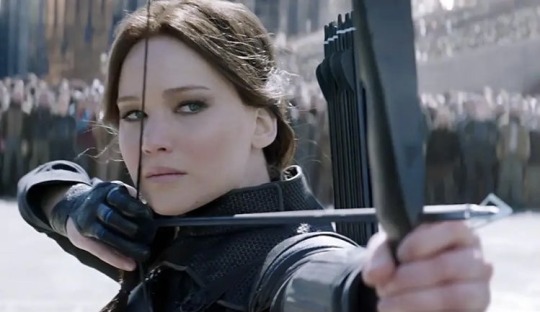
Final note: If we’re being honest, we all have a bit of internalized sexism and judge without thinking about potential effects on others. Sexism won’t cease to exist easily, but if we only take the time to consider our motives—even subconscious ones—we can help stifle our biases and most importantly, create a healthy environment where girls can express themselves.
TL;DR
Society loves to put girls down and make fun of everything they like, which stems from sexism and lack of analysis. In reality, there’s often real, important purpose to the things they enjoy. I also definitely used The Hunger Games and Twilight as examples :)
p.s. i am also in love w katniss<3
#the hunger games#hunger games#writing#team peeta#btw#essay#analysis#katniss everdeen#catching fire#mockingjay#twilight#pop culture#women#feminism#sexism#fandoms#equality#society#modern culture
187 notes
·
View notes
Text
Diversmagazin Interview Translation

Diversmagazin released an interview with director Sarah Blaßkiewitz and Head-Writer Jasmina Wesolowski today. Read it here in German.
Jasmina (she/her), DRUCK writer since season four and head writer since season six together with Jonas Lindt. In a writers Room with Paulina Lorenz and Raquel Kishori Dukpa (Jünglinge)
Sarah (she/her) director of the last four episodes from season six
I’m leaving out the general introductory questions.
Alicia: Can you talk about the writing process? And what’s the most important thing for you while writing and telling stories?
Jasmina: We especially wanted the profound exchange with young adults who represent our protagonists. For season six we had the challenge that we wanted to tell the lovestory of a Gambian-German girl and a Vietnamese-German girl, perspectives that aren’t represented in the writer’s room. That’s why we talked a lot to research partners, to make up for our lack of knowledge/ experience, but we also talked to the actors and actresses.
Alicia: Why do different directors work on DRUCK?
Sarah: We try to produce as much in real-time as possible. And of course, we have to pre-produce but still have to work [overlappingly]. While one director is already in the editing phase, the next one already starts to shoot. Another reason is of course, that this way, also in the writer’s room, there’s more space for diversity.
Alicia: It’s similar to the writer’s room. You’re also dividing the writing of scenes between different people. … Are you working together with racism and LGBTQIA+ experts?
Jasmina: I think we all have blind spots and that it’s absolutely impossible to end up with a perfect result. It was an important first step, that the Jünglinge collective joined. They are big advocates for queer BIPoc representation in German media. They were always present for feedback loops and made all of us, crew, actors and actresses, participate in an anti-racism workshop. We were lucky to have the brilliant author and anti-racism trainer Arpana Berndt, who advised us on these topics. On top of that, we did a lot of research on different topics. I think now it should be the only way to produce movies and shows this way, with an intensive research phase. This way you don’t appropriate the stories of others and also don’t tell inauthentic stories or, in the worst case, use hurtful clichés/stereotypes. It was helpful and needed that Black perspectives were present also behind the camera – Sara as a director, but also in the social media team, make-up department or costume design. But we are also aware that more can be done.
Sarah: It’s important to me to highlight the make-up and costume design department. When I, an afro-German person, joined this project and met other afro-German women in those departments, who can relate to me, the character of Fatou and Ava, I was really glad. I can say from many years of experience that that’s not a given.
Alicia: How about experts on LGBTQIA+ issues?
Jasmina: To talk a bit about the process: We were set on Fatou being a lesbian pretty early on, and that was already discussed in the earlier writer’s room, where that perspective wasn’t present yet. In the beginning, those were loose ideas, and we had to implement them with the casting. The casting team Raquel Kishori Dupka, Melek Yaparak and Angelika Buschina worked closely with the directors and contacted different institutions and specifically asked for actors and actresses who could be queer. At this age this is of course a super sensitive topic. You don’t want to force young people to [define themselves/come out]. It’s a huge challenge to handle that with care and it was extremely important that the Jünglinge collective was part of the casting process.
But also, apart from the casting process, we profited a lot from the queer people in the writer’s room in the cast.
Sarah: For my part I asked the authors and queer people “What would you like? What is nice? What hurts? What’s important? Or what have I never seen before?” And then I put those different experiences into the different scenes. On top you of course need common sense (?) to portray something that you haven’t experienced yourself.
Jasmin: I just thought of a small really beautiful example: How Fatou was given these rainbow socks as a Christmas present. You immediately notice, that was the idea of a queer person who knows what non-queer parents give to their kids as gifts. The fans notice: Queer people were in the writer’s room. Or “Ah, these actresses know, what they’re doing.“ And those are the small things that make a difference.
Alicia: For sure! In DRUCK you notice that queer people were part of this in really subtle ways, and that [resulted] in really nice fan-moments. I can confirm that.
Right now, the community is discussing the conflict between Mailin and Ava a lot. What role does that conflict play for you and what does it teach us?
Sarah: I’m editing the last episodes right now, so I really feel it, also because you already see the reactions online.
For me, the conflict is important because it shows over a long period of time, that not everything is always only good or only bad. That it takes a lot of time, patience and confrontation to understand all nuances of that kind of conflict.
That Ava could be prevented to outright say what’s bothering her, because we’re talking about a really serious trauma of exclusion. How do you even tell people really personal stuff when you were bullied for years? And now we have that conflict, that seemingly takes forever, and you’re always asking yourself: “Why aren’t they talking to each other?” But it’s only in real time that you realize how hurtful this conflict is. How hurtful it is what they experience. What racism means, and also what it means to [deal] with that topic as a white German girl. And I think it’s really important that everyone is going through that with this season. That takes time and sometimes hurts. And you don’t always understand Ava and you don’t always understand Mailin. When we really [dedicate ourselves to understand this conflict] then I think, we can experience what for example a person like me experienced their whole adolescence. I’m not saying I was bullied my whole adolescence, and maybe it wasn’t because of the color of my skin, but because of something else. But that went on for half a year. After being bullied in school for half a year you’re not up for school and your classmates anymore. And you don’t talk to them anymore. And if people realize that because of this season then I’m glad. I think it’s really touching that this conflict takes up so much space.
Jasmina: I found it really interesting what you said about the nuances, because it was a real process for me to learn how many facets this conflict has. And especially that us white people, who grow up in a society with structural racism, have a particular idea about what racism means. And that’s not a detailed and uncritical perspective of that topic: As soon as you call me racist, I feel attacked and start defending myself.
The role that this conflict played for us was to show how incredibly exhausting it is as a Person of Color, to always have to deal with these problems and that there’s a kind of fatigue, that you don’t want to talk (or should want to talk) about certain topics anymore, especially if you have other things going on in your life on top of it.
On the other hand, we have Mailin, who has a strong desire to understand. She’s not aware of her privileges as a white girl. We want to take this journey together, when she starts to realize things and when she goes through different stages; until she understands, what it is really about. We also have an arc there that isn’t finished. Because in real life, you have to deal with some topics over and over again. We think it’s especially important to show that it’s not the job of Black people to explain racism to their white friends. By now, they have all the resources to educate themselves and to talk with other white people about this topic, to unburden Black people.
Alicia: That’s really interesting! The lovestory of Kieu My and Fatou is an important part of season six, which many queer young adults love. How is the relationship between Fatou and Kieu My representative for a generation?
Sarah: I can actually also see it in an older generation. When I send the cuddle clip of Kieu My and Fatou to my grandpa, he says “Wow, how amazing that a Viet-German and a Afro-German girl are lying in bed together, talk in German and are in a relationship.” This generation hopefully isn’t alone anymore, for example in the sense of: being the only Afro-German person in a small city. That changed and now we see it in that second and third generation. And that’s why it shows me something very real and beautiful.
Alicia: Which scene are you really proud of and why?
Sarah: My favorite scene, and one I’m really proud of and that was really important concerning the pressure of school, was with the main character Fatou. It’s about a path of finding yourself from Fatou and a [Reinigungsmoment] with her brother. Two people, who know each other from the moment of their birth, are sitting together. When I read that scene I thought yes, I can relate, I can feel that, and when we shot that, a world opened for me. And that was partly because of the music, which was decided before we shot this scene. Then we shot it and it was fucking cold, but we shot it again and again but every time we really felt it like the first time. And when I now watch that scene while editing, it really is the perfect moment. Every facial expression is perfect, every reaction. And that’s that kind of truthful (?) moment you’re looking for as an actor, actress, director or author. When everything fits.
(There’s a script for every social media part, What’s App Chats and ideas for social media stories. )
Alicia: When can we expect the next season and what will it be about?
Jasmina: For now, DRUCK is finished and we have to wait how it will continue. Fingers are crossed and of course we’re hoping for a new season.
[Note by me: We‘re not gonna spiral, Jünglinge looked for more writers, Black writers, on facebook a while ago. Nothing is safe but they probably don’t want to make any promises]
#druck#I hope it's understandabl vghghv#It was really cool to hear their thoughts on the mailin ava conflict and bullying storyline
157 notes
·
View notes
Text
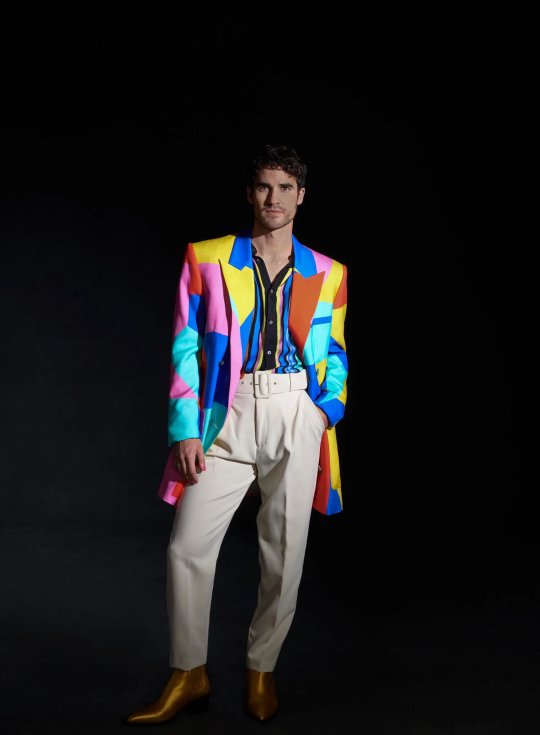
1883magazine.com
Darren Criss
On his new EP ‘Masquerade,’ the multi-talented Darren Criss welcomes everyone to the party.
Throughout his career, Darren Criss has never been one to shy away from boundaries. As an actor, he has won numerous awards and critical acclaim for his portrayal of Andrew Cunanan in Ryan Murphy’s award-winning drama American Crime Story: The Assassination of Gianni Versace, as well as hearts and a cult-like following for his portrayal of Harry Potter in Team Starkid’s A Very Potter Musical. As a musician, his talent shows the same range; he is as well known for his ability to belt a broadway ballad as he is for his covers of Top 40 hits on Glee.
For Criss, this is because all music is simply music. Musicians and listeners alike need not box themselves into certain genres and while this concept is currently growing in mainstream media, it is one Criss has known since he was a teenager. At Warped Tour, he encountered fellow San Franciscans Me First and the Gimme Gimmes, a punk-rock cover band that specializes in the unexpected (their most played track on Spotify is Country Roads.). Inspired by what he’s always known was possible, Darren’s career has had freedom most artists take years to explore — and with his new EP, it’s clear that is the most recent chapter.
‘Masquerade’ is an exploration into Criss’ more eclectic side with each track on the record representing a different persona or masque for the artist. The overt character-driven quality of the EP lends not only to allowing fans to learn more about Darren Criss, but also to create a project where something can be found for everyone.
1883 Magazine spoke to Darren Criss about his perception of genre, his new EP, and the curse of creative people.
Congratulations on ‘Masquerade’. I love it. It’s so fun!
Fun is a very fair adjective, I would agree.
I feel like there’s a very cohesive vision or aesthetic to it. When you set out to make the project, did you have this end goal in min or were you just making music?
Yes and no. First and foremost, when you’re dealing with the whole of what an artist does, there are so many different facets that make the whole piece. To start, I’m just a songwriter — that’s the main thing that seeds everything else. But, because I’m a creative person, I’d like to think that I have a somewhat cohesive vision for my projects. However, you can conjecture and pontificate over what you want to happen, but ultimately a project is going to come out how it does. The thing that ties it all together, hopefully, is the artistry of the music or the person’s voice. When I heard you say “cohesive” my mind was like, “Phew!” Because we’re all scatterbrained people and we just constantly pray other people somehow think that we planned something or we had it envisioned all along, so to hear that is an enormous relief.
That being said, I had hope for how the EP would come together. I’ve been leaning into this notion of a character-driven song. The dirty secret about that is all songs are character-driven; all art is character-driven in some way or another. I just use that wording to aide folks that might be perceiving me as an actor and to apply that methodology to music.
How so?
I always thought it was a bit of an unfair double standard — where actors can be in a horror movie or romantic comedy — and we’re still behind that person as an actor. Actors can put on a prosthetic nose or a wig and do different things to service whatever story they’re doing. Historically music has been a little trickier, but now I think that’s changing. I’ve always been a self-proclaimed genrephile. I love so many different kinds of things. Growing up it was difficult for me to really assert this without confusing people. Now, that kaleidoscope has shifted in my favour, because people are more into eclecticism and musical diversity due to playlist culture and the whole homogeneity of everything. I’m employing this notion of being an actor and being behind a character and applying it to music by treating each song as its own kind of character. I want the art to correspond with that.
That’s an interesting concept to apply to music.
I know that everything I just said is horrifically more cerebral than it needs to be. If you like the music and it’s fun, great. I’m just trying to help people out that might be confused by perhaps some of the cognitive dissonance that’s happening between some of the styles. At the end of the day, it’s an artist’s voice, literal singing voice, and heart voice — what they have to say and how they say it — that tie everything together. People are more accepting of that than they used to be. This is exciting for me because I finally got to lean into something that I’ve always leaned into my entire life.
The last EP you released was ‘Homework’ in 2017. How do you think you’ve grown as an artist since then?
For me, obviously, there’s personal growth and professional growth. I think my growth is much more technical — getting better at recording music or being able to translate abstract ideas into physical recording — the things that I don’t think necessarily would be seen on the records. Again, much like an actor, ‘Homework’ was me playing the part of making a very low-key, singer/songwriter record. I’m a big believer in dressing for a party. I had some singer/songwriter songs that I wanted to honour. Each record I release shows a different version of myself that I haven’t gotten around to sharing.
The songs on ‘Masquerade’ are not like, “oh man in the past few years, I’ve suddenly become this person.” The EP was me finally getting in touch with my more Garage Band musician roots that I hadn’t been able to flex. It made sense to me to finally make this music. I had linked up with people that I thought could help me bring it to life in a way that hadn’t been done before and I felt like the timing was right. As I mentioned, it seemed like audiences might be a little more privy to this kind of thing.
I don’t want to be so stubborn as to think that there hasn’t been growth. I’ve been so lucky as an actor, that I’ve been busy as an actor. The only obstacle to me putting out more music, which I wish I was doing all the time, is time. I’m not an artist that just shows up, sings, and checks out. I’m writing, I’m producing, and I’m really in the weeds. It takes a great deal of investment, emotionally and mentally when I make music.
So, when you say, “you wish you were always releasing music,” do you mean to imply you have more music or at least ideas for more music?
I think the curse of creative people is that our ideas move faster than our bodies can execute. What this inevitably will create is a huge queue of unattended things that you will always be haunted by. From there, you have to catch as catch can. At any given moment, there’s still so much more in the queue that I want to put out. It literally took a global shutdown for me to finally have the time to look at the said queue, and say, “Okay, which project do I not only really want to do, but also do I have the resources to do and do I think fits into where I am right now?” Because I’m very cognisant of l where I am in my career. I have this huge selection of songs and when I have the time to focus on music, I go through and pick the ones I think fit where I am mentally and how I think other people are feeling.
With all these different genres of music you’ve released and all the music-centric projects that you’ve been a part of, is there a type of music that you enjoy performing the most?
I would say everything, but I don’t mean that in a way to just include everything. By nature, I’m a dot connector; I like shortening the distance between two things as much as possible and showing people how they can coexist. It’s my MO personally and professionally. Genre, while it has a lot to do with the cultural background and history of a type of music, is the boxes that we’ve arbitrarily made up to categorize and market music. I’m completely nondenominational when it comes to genre because all I can hear is chords, melody, and lyrics. It’s never been separated to me. When I’m performing live, I relish getting to lean in and bring together genres. I love using the setlist to show an audience how similar different genres are. For example, I’ll play a punk rock song and right after that I’ll sit at the piano and sing a ballad. My voice will be a little different, but it’s still my voice. Just like in acting, no matter what character an actor is portraying, it’s still their face and their body. Trying to minimize a distance between genres when I perform is an exciting prospect because I like getting audiences to rethink what they think they know about the differences between genre and how really at the end of the day it’s all just storytelling. So…I like performing it all.
I didn’t say you couldn’t say you liked everything. [Chuckles] That’s a perfectly acceptable answer.
I like putting all of it together specifically to show the similarities. Historically, all the great steps forward in a new kind of art form have been by mashing two or three seemingly unrelated things together. It’s happening constantly. It’s happening right now. Culture is a constant conversation back and forth. It’s a sharing of ideas that ebb and flow to create something new. I’m not saying that I’m taking part in this ancient conversation, but I’m certainly enjoying it. When I see pieces of it that I would like to showcase, I jump at the opportunity to do so.
Since ‘Masquerade’ has been in your creative bank for a while, what would you say inspired it?
Every song has its own inspiration. The album doesn’t really have an inspiration. If anything, I’m trying to make sure that I can show up for myself. I feel like with everything that I’ve done musically, I haven’t gotten to represent who and what I am and what I do. To me, this EP gets me closer to that goal. I still think that only a small percentage of me has been represented and that’s just because of time. I haven’t been able to focus on music in the way that I’d like, but ‘Masquerade’ is a huge stride for me.
Speaking of you being on Broadway, Elsie Fest is Sunday! On top of it just being exciting because it’s back, it’s your first public gig in almost two years. What did you miss most about the festival?
Listen, even without a global pandemic to worry about, putting on a music festival is hard enough. It’s one of my favourite times of the year because I’m very proud of what we’ve built and what we’ve continued to build and expand upon over the years. There’s been a community that has been built around not only people that come to the festival but people that have been part of it. I’ve followed these performers’ careers and I’ve been really grateful that we got a piece of their magic and got to be part of their journey at Elsie Fest. Magic which I can’t take credit for. I just lucked out with having incredible people perform. Over the years, we’ve had Cynthia Erivo perform twice. The first time she premiered a song called ‘You Will Be Found’ from a musical that would open in a year called ‘Dear Evan Hansen.’ We premiered a song from a movie called ‘The Greatest Showman.’ Keala Settle went on to win a Golden Globe for that song. Last year, we had a young girl from Disney sing for us — her name was Olivia Rodrigo. Those are just three examples. There’s been a lot of people that I’ve been thrilled to see do their thing. This year we have an incredible lineup. Barlow & Bear are coming, along with Jordan Fisher, Adrienne Warren, Pentatonix’s Kirstin Maldonado, and Alex Brightman. It’s gonna be great.
The obvious and the biggest answer is getting to perform live within as much of a safe and comfortable environment as humanly possible. Luckily we’re an outdoor festival, so that’s already to our advantage. I will be performing this new EP, but there is also a lot of music to catch up on and a lot of music I want to share. I’m mainly excited to share it with other human beings. I look at performing as a service industry. Everything that I do isn’t worth a whole lot unless other people experience it because it takes on a life of its own. The audience is not there for me & I’m there for them. I’m trying to service an experience that’s bigger than both of us and create something that couldn’t have been there if both parties were on their own.
Before I let you go, I need to tell you that Tramp Stamp Granny’s is one of my favourite bars in LA. I’m obsessed! I haven’t made it back yet. Like I said earlier, the editor Kelsey is also one of my best friends and when she comes, it’s top on my list of places to take her.
Really?! That makes me so happy. You couldn’t have said a better thing. We’re open again to limited capacity. We require vaccinations cards at the door and we’re only open Thursday-Saturday. Talk about being with people — the night we reopened, about a month ago, I got pretty emotional. It was nice to see people just being happy to sing and celebrate life with strangers. That was a really encouraging sentiment because despite the use of digital communication which I do think is an amazing thing, we, so clearly, inevitably, yearn for each other. Despite everything, people were coming to the bar and were so happy to be there and be around other people. Our need for other human beings is a constant that is extremely encouraging to me as a bleeding heart idealist. It’s nice to be a small part of that.
Finally, you said earlier Barlow and Bear were going to be at Elsie Fest. I cannot wait for the Unofficial Bridgerton Musical and was so excited to see you’re involved.
It’s cool meeting them because in a much more organized and impressive fashion they’re doing what my friends and I did ten years ago with ‘A Very Potter Musical.’ They are insanely talented and deserve to be the huge phenomenon they have become. They’re the future. I’m trying to grab onto their coattails however I can. [chuckles] They’re just getting started. I’ve been a big fan of Emily’s for a long time. She hates it when people say this, but [mock yells] she was a child prodigy and she still is. She’s an amazing human being.
Masquerade is out now.
Follow Darren Criss @darrencriss
Interview by Sydney Bolen
#darren criss#1883 magazine#elsie 2021#masquerade ep#tramp stamp granny's#homework ep#press#august 2021
33 notes
·
View notes
Text
Aurora: “People attack people that are different so quickly”

Interview by Aleksandra Brzezicka for Dork magazine (August 4th, 2021).
Aurora has paid a few visits to the world of mainstream media so far. You might know her from John Lewis Christmas advert, feature on ‘Into The Unknown’ for Frozen II or, most recently, ‘Runaway’ challenge where people would pose against a starry sky to the sound of her, now trending, song.
“I know for sure that ‘Runway’ can be a very good friend in times of need. It has been to me, and it’s always been nice for me to sing that on stage throughout my years of touring because it always brought me comfort,” she says.
Still, Aurora’s much more than your everyday social media sensation; she’s a soul-touching, 25-year-old Norwegian musician with an international cult following. Ever since the 2016 debut album ‘All My Demons Greeting Me As A Friend’, like an empress, she’s been calling on with an ethereal voice all the outcasts to join her queendom. It’s a sanctuary ruled by the laws of magic and build on the solid soils of equality. Who wouldn’t want in?
“I go very deep within myself when I write songs, and I feel like that place I go to could be a magical world. I’ve always felt like I want music to be a way for us to face ourselves and our emotions,” she shares. “I try to make sure that people can disappear into this other place, and it’s a bit better than this world. I feel like it’s important for us sometimes to dream ourselves away and just be safe for a little while before we go back to the real world.”
The real world can be a scary place, especially if you feel like you don’t belong anywhere in particular. That’s why Aurora is making her grand comeback with ‘Cure For Me’, a new single that’s a playful spin on a very serious subject. “Inspiration for the song was mainly the countries where they can still do conversion therapy for gay people. I was just imagining how it must feel to be brought into place and be told that what you are is wrong and you need to be cured of it. Cured of your love. I thought how insanely helpless you must feel and how horrible it is and everything in the world that makes us believe that there’s something wrong with us,” she comments.
Aurora dug deep into society’s perverted psyche, trying to understand our tendency to undermine ourselves and question reality based on archaic views that never served us right. ‘Cure For Me’ is a declaration of independence from that cracked cycle. “It’s a celebration of everyone that’s been told that there’s something wrong with them. Nothing is wrong with us, and we should just embrace ourselves and let ourselves be. People attack people that are different so quickly. It’s a celebration anthem to reassure yourself that you’re fine,” she confides.
Though the single came to life two years ago, in the midst of touring, the time for it to be out is now, when every day can feel like we’re on the verge of some new catastrophe. “It’s a very fun song, and it’s very playful because we need it. I think we need it, the playfulness,” Aurora says.
After spending what was like a lifetime away, gracing international stages, Aurora felt a sense of relief finally being able to hide away in the cold cosiness of her Norwegian hometown. Surrounded by nature, closest family, books and art, she contemplated the meaning of broadly-defined existence and everyday hassles. “It made me thinking how much work we have to do, and it had also reminded me how strange this world is and how many things don’t really matter,” she says. That strangeness is a motif often underlining her music as it was from another universe. A universe where you can run with the wolves and dance on the moon. Entry fee is a small amount of child-like naivety and a strong desire to believe.
Asked what would she would do wielding any magic power she wishes, Aurora says: “Go back in history and prevent the fact that Europe took all the resources from Africa. Just prevent all of the things that made the world as it is today. People are at war and starving because many, many years ago, other countries took everything they had, so they were left with nothing. If people can just stop being hungry for more when they more than enough or they have enough because so many people have nothing. It should be a simple thing to fix. I don’t understand why some people need to have everything.”
As exciting it is to be one of the most interesting, and successful, voices on the alternative music scene, standing in the spotlight can be tiring after a while. That’s why, whenever in need of a recharge and a slight shift of perspective, Aurora confides in nature. She’s lucky enough to see mountains from her Bergan apartment. “Nature keeps me very inspired because I love her, and also, she’s in pain. She’s given us so much, and she’s so diverse. Multi-diverse. She’s beautiful, dangerous and sensitive. It’s very inspiring for me to think about Mother Earth and all of her powers. Her hardness and softness. It’s very spiritual and magical for me. Like music.”
While Aurora’s magic is sourced somewhere out-of-this-world, she doesn’t want to keep it locked there. The goal has always been to share it with anyone who might need it as much as she does. Her tribe of daydreamers stays grounded to reality and ready to stand up against any inequalities and insensitivities of this era.
“I’m very inspired by people around me because people are going through so many things, and they all think that they’re alone when in reality there are so many people going through exactly the same. We can just speak about it, and we don’t. That’s very fascinating to me how scared we are of opening up,” she shares. If Aurora says so, maybe we shouldn’t run away anymore. Following her lead, let’s learn how to open our hearts to each other. Even if only a little bit.
33 notes
·
View notes
Text
Patton and Monty at War: Unbelieving the unbearable rivalry.
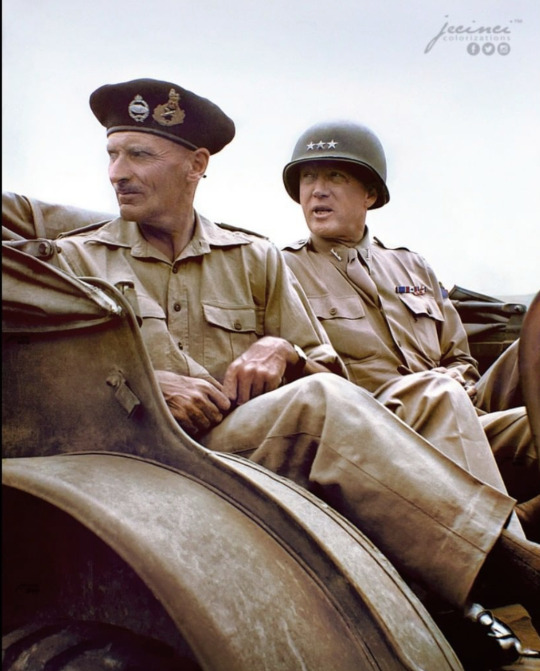
Monty is trying to steal the show and with the assistance of Divine Destiny [Eisenhower] he may do so.
- General George S. Patton, on the Sicily Campaign, private diaries 16 July 1943
So every week I play my usual game of chess over a glass of wine with one of my neighbours in my Parisian apartment building. He’s a retired army general but remains active as a military historian and speaker. He’s curmudgeonly but one warms to him quickly as he doesn’t suffer fools gladly. He’s not a fan of women in the military but reluctantly concedes he would make an exception for me (besides who else could he play chess with?). We get on really well now because of the Covid lockdown this past year. We often have long discussions about military history and current politics until the bottle of wine is completely drained.
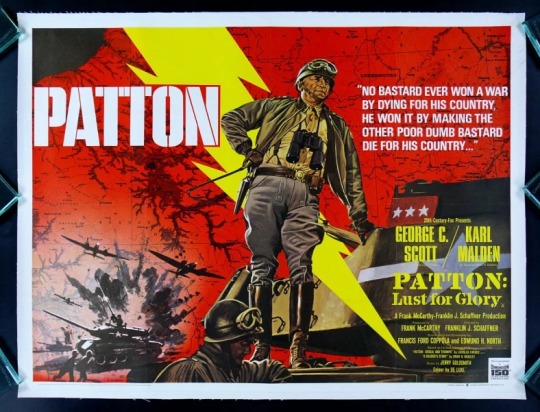
On one occasion he invited me to watch the 1969 classic war film, Patton, about the life of one of America’s greatest iconic World War Two generals, George S. Patton. It’s been years since I’ve seen it and I almost had forgotten how great the movie is with George C. Scott as Patton and Karl Malden as General Omar Bradley. We watched it in English and then discussed many things that came out of the film.
Hollywood and history usually do not mix. It is quite common for filmmakers to take a historical subject and to distort it for their purposes and to dumb it down for entertainment purposes. In the case of the movie, Patton, there was no real attempt to distort the story of Patton. It was a fantastic and stirring Hollywood movie. Moreover it was an excellent study in character given Oscar worthy heft by the great George C. Scott as the crusty General George S. Patton. Francis Ford Coppola’s script was severely under-rated.
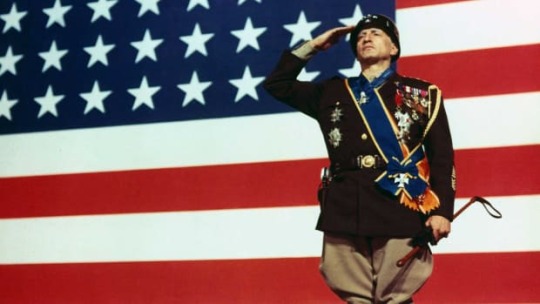
However there remain glaring inaccuracies such as Patton’s opening speech in the movie - admittedly a an iconic bit of cinema - but even this was based on his statements and captured the character of the man, something even acknowledged by the Generals’ family.
Much of the details of his role in the defeat of Germany are true. The only real omission was the lack of focus on Patton’s Lorraine Campaign, where he distinguished himself. There are some exaggerations in the movie and some minor distortions such as in the weather-prayer scene. In general, the movie managed to produce a great overview portrayal of the character and career of an extraordinary American leader.
The film does accurately relate the leading role played by Patton in the liberation of Sicily. His daring use of armour was crucial in the defeat of the German army on the island.
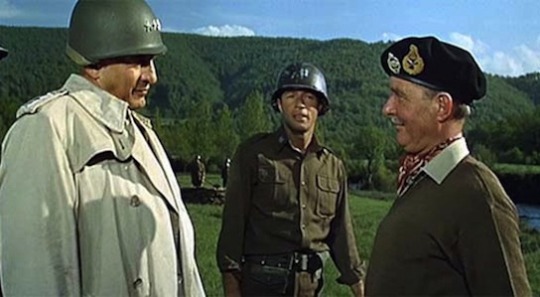
However long after the film had ended I did think about one thing that irked me. And this was how the movie seemed to linger on the belief Patton was motivated by the desire to do better than General Montgomery, the victor at El Alamein. Indeed the film probably reinforced the accepted conventional wisdom that these two driven and ambitious men hated each other.
There was a great personal rivalry between the two men. They were both driven and wildly ambitious. The movie suggests that the rivalry between Montgomery and Patton was the main feature of the Sicilian Allied campaign and was perhaps a factor in why it ended so quickly with a decisive Allied victory.
The rivalry was not as intense as the motion picture suggests and the two men worked together when needed for the good of the Allied cause.
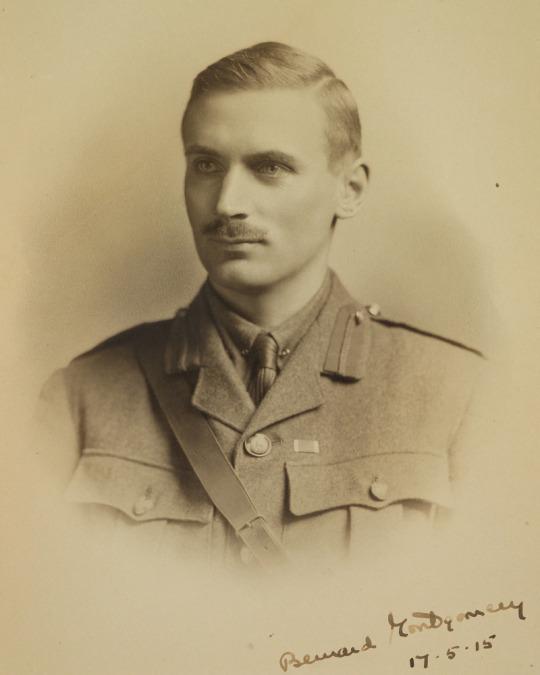
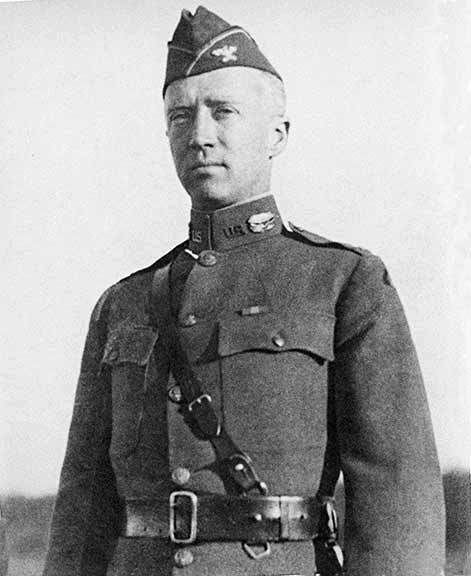
Born two years apart, both were commissioned within a year of each other and both were wounded in France in the First World War. Both men encompassed very different but very valuable characteristics in combat: Monty-careful and meticulous, Patton-dashing and diplomatic. Despite the differences, both generals demonstrated striking similarities: commitment to their careers, a ruthless egotism, interesting when you consider neither held superior command. This did not impede their desire for the limelight and fame in warfare, arrogance and the manipulation of colleagues in high places to advance their careers. Both were machiavellian in their own affairs and self-interested in their own personal progression.
The great rivalries amongst the Allies that made a real imact were Marshall and Brooke over war policy, Nimitz and MacArthur over resources, Eisenhower and Montgomery over strategy; and then between Percival and MacArthur for incompetence, Patton and O'Connor for aggressiveness, MacArthur and Clarke for vainglory, (and possibly Clarke and Wavell for the stupidity of letting defeated enemies escape), were the issues that defined the war for the Western allies.
The idea that a competition between Patton and Montgomery was more important is cute, but naive. I am not even sure where the idea comes from.
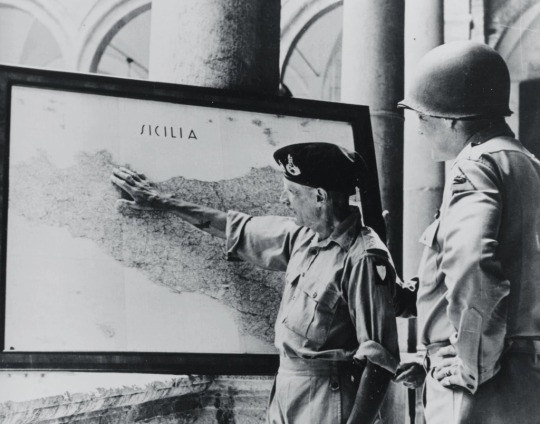
Much is made of the bet between Patton and Montgomery over reaching Palermo in Sicily first, but in practical terms that was the only time in the war that Patton ever appeared on Montgomery's radar.
For the rest of the war Monty was so much higher up the food chain than Patton that he was unaware, or disinterested in Patton's opinions. Montgomery was, by 1944, an experienced general who very successfully fought extensively in both combat and staff roles for 4 years throughout World War One. (Patton got a combat command for a few weeks when the Germans were already collapsing.) Montgomery led a division very successfully through the Battle of France, and a corps through the crucial Battle of Britain training and rebuilding years. He led an army in combat for two years, through many successful battles both on defense and in attack.
By 1944 Patton had led a corps for a few months, and an army for a few weeks. For the very brief period of the Sicily compaign they were theoretically equals in command, but probably only in Patton's mind. Montgomery saw Patton as an enthusiastic if amateurish old man but respected his aggressive boldness. Montgomery saw his HQ 'betting book' as a bit of fun (and was delighted when bet a B17 by someone who should have known better).
When he and Patton met and co-ordinated the Sicilian campaign Alexander seemed not interested in co-ordinating, Monty saw Palermo as a similar bit of fun to pursue, no bigger or smaller than the hundreds of other bets in the book.
Patton saw it, as he saw anything relating to his persona, as the most vitally important challenge of his whole life...up until the next one. Montgomery lost a bet and moved on to the next challenge. Patton won but didn't. (Or at least that is what bad writers have tried to suggest. I think he moved straight on to the next challenge anyway.)
That was the last time Monty and Patton were in direct competition, no matter what revisionists or romantics would say.
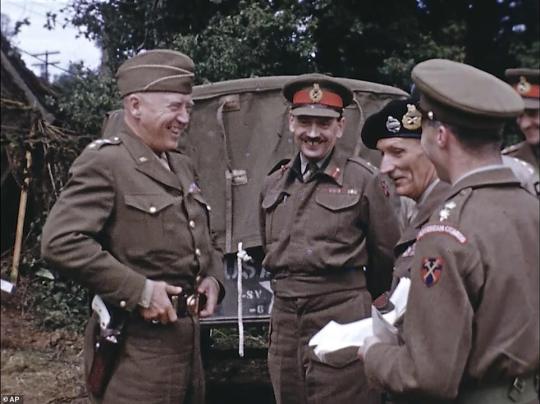
The next time Patton was allowed in the field he was one of half a dozen army commanders in Monty's Normandy army group, and, familiarly, he did not arrive until the Germans in Normandy were already collapsing. Very soon afterwards Eisenhower split off Bradley's army group, and Monty had no control, nor much interest, in what Patton was up to thereafter.
The romantics like to suggest that thereafter Monty railed against Patton's supplies, and that Patton railed against Montgomery's caution. The truth is less foolish for both of them. In fact Montgomery railed against Eisenhower's broad front strategy regardless of which of the other sub-commanders was benifitting (to the point of Montgomery making an offer to serve under Bradley as long as someone got single control to pursue a single strategy). He railed against the diversion of resources anywhere not at the main point where a thrust might have achieved early victory.
Leaving aside whether that victory could have happened, Montgomery's beef was with Eisenhower first, his appalling chief of supply Lee second, fellow Army Group Commanders who couldn't control the excesses of their subordinates like Bradley (and to a lesser extent) Devers third, and only then with the several army commanders who each tried to do their own thing.
In practical terms Montgomery seemed more appalled by the negative effects of the incompetence of Hodges (1st US Army,) and the obnoxiousness of General De Gaulle's orders to 'his' army (French First Army), and perhaps even the ineffectiveness of his own subordinate Crerar (Canadian 1st army) , than he did by Patton's enthusiasms. There is hardly a mention of Patton in his diaries through this period, compared to several comments on Bradley and De Gualle, and endless ones on Eisenhower.
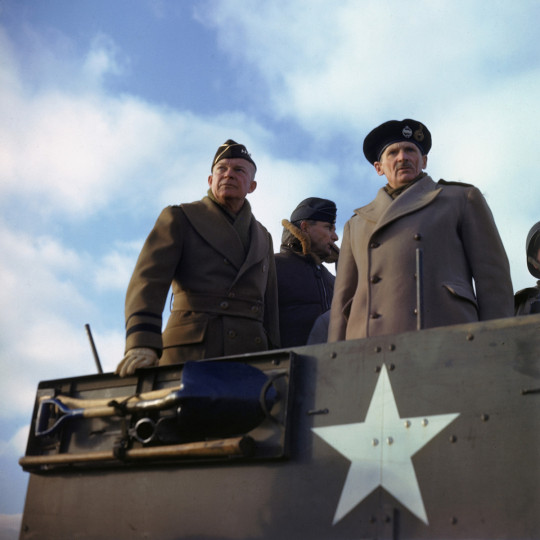
Patton too is being maligned by the pretense that his war was taken up with a vain competition with Montgomery. Patton, like Montgomery, was totally concerned with the main issue of defeating Germany. But unlike Montgomery, he did not have Brooke - the Chief of Imperial General Staff - to rely on for support against Eisenhower's broad front strategy.
Patton too was convinced that this was the wrong way to go, but to get his version of a thrust (with him at the front) happening, he had to be a bit more manipulative than Montgomery.
Every word Patton used to wheedle and manipulate support, or at least a blind eye to what he was doing, was designed to get more resources from his superiors. Indeed, if he couldn't get them from Eisenhower, he was willing to steal them wherever he could, and then get Bradley to pretend to not know what he was doing. In this he was quite willing to encourage Bradley's inferiority complex in relation to Montgomery, and to happily manipulate Bradley into tantrums to get what they both wanted, but it seems likely that Patton was more interested in getting his way by making his superiors compete with Montgomery, than in competing with Montgomery himself.
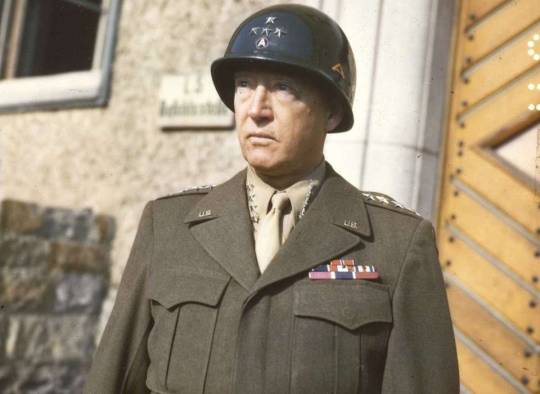
Patton is actually a more complex and clever character than the romantics give him credit for. His 'kill them even if they try to surrender' speeches in Sicily were part of his stage management of troops, not part of his innate personality. HIs 'us against the world' propaganda was more manipulative, not so much like Bradley's inferiority complex. He wanted to win, and he would use anything to get what he needed to win, even ramping up his superiors to distrust their allies. But his genuine competitiveness with Montgomery at this stage was less about him and Montgomery, and more about him and how he could maneouvre others to support him. He would have shown the same level of competitiveness, and the same willingness to undermine, any competitor at this point, British, French, Russian or even American.
Montgomery on the other hand only saw Patton as one more junior general syphoning supplies from an inadequate source. Montgomery was in competition with Eisenhower for control, and possibly with Bradley for resources. Minor army commanders in other people's army groups only registered on his horizon if he could get their armies assigned to his army group.
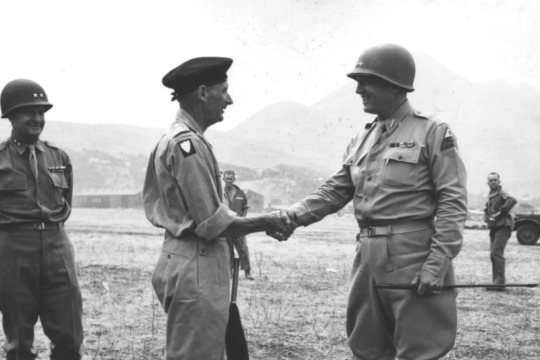
Just for amusement, it might be fun to consider how Montgomery and Patton might have worked together?
Montgomery was notoriously superb to serve under, no matter what your nationality. British, Australian, New Zealander, South African, Indian, Canadian, French, Polish, and American troops who served under him were all very happy to do so. So were their generals. Bradley certainly learned more about being a field commander from a few months of Montgomery's distant mentoring than from anything Eisenhower ever did for him in their much closer relationship.
There is no doubt that Montgomery preferred effective subordinates to ineffective ones, and it seems possible that Patton would have made a preferable subordinate to Crerar or Bradley in his mind.
As for Patton, he would have served anyone who got him what he wanted. Had Montgomery offered him the chance to spearhead the attack into Germany, there is virtually no doubt that Patton would have jumped at the chance.
Patton was not the racist that Bradley or Eisenhower were, and was happy to have black troops. He was not the American supremacist that Roosevelt or MacArthur were, and worked well with others (as long as they let him have enough lime light).
Had Montgomery been left as land forces commander, there is little doubt that he would have used Patton's aggression in a way that would have made Patton much happier than Eisenhower's broad front strategy ever allowed.

It is fun to imagine Montgomery as land forces commander using Patton's 3rd Army in conjunction with British 2nd to leapfrog ahead at top speed into Germany. The best British tactics were never the broad front strategy that the worst American's like Marshall and Eisenhower fancied. They were always the 'hold the enemy, crumble the enemy, breakthrough the enemy, and pursue with as much force as fast and far as possible' skills that had worked since the development of mechanised warfare in 1918. (As demonstrated by the Germans in Poland and France and Russia, the British and Germans in North Africa, the Japanese and British in Asia, and the Russians in Eastern Europe.)
Montgomery would have used his traditional two corps up, one back, one resting deployment, adapted to armies, to keep up the momentum. Patton's preferred tactics were almost exactly the same, and he and his 3rd Army would have fit it like a glove into Montgomery's thrust strategy.
Personally I think that the limited reality behind their competitiveness paid trumps in Sicily, and I wish that it had been repeated in France. Patton could not have been a worse Army group commander than Bradley was, and would almost certainly have been better.
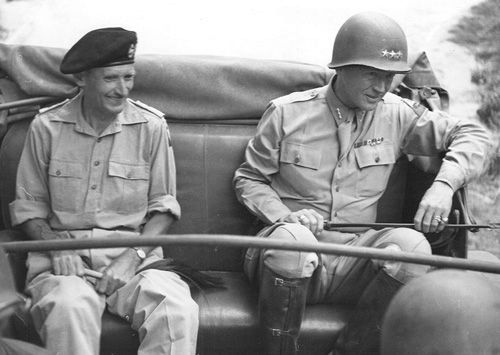
It is amusing to think of Patton and Montgomery effectively conspiring to destroy the broad front strategy while they got on with winning the war in the best spirit of competition. Although I have a sneaking suspicion that one of Patton's biographers was right to suggest that by 1945 he had suffered a few too many hits on the head, there is little doubt that he would have been almost as valuable to the Allied cause in Bradley's place against Eisenhower's policies directly, as he would have under Montgomery's army group. That might have been a useful version of rivalry.
#field marshal bernard montgomery#montgomery#monty#general george patton#patton#us army#british army#second world war#war#warefare#leadership#history#generalship#tank#eisenhower#military history#general bradley#general eisenhower#personal
58 notes
·
View notes
Text
Creator’s spotlight: alifeincoffeespoons
It’s September and our fourth Creator’s Spotlight is here! We are so happy to share with you today the thoughts of a wonderful creator: @alifeincoffeespoons. We’ve rec’ed her fic Sirius and Harry go to Whitecastle here and we did the description for one of her artworks here (which includes the rec of some mitski songs!!).
As usual, here you have one of our favorite quotes of the interview, and under the cut you can read the full interview!
“Remus and Sirius understand each other on a level that few other characters in the series do. They have so many shared experiences and so much history, and there’s so many different ways to write them as a result. They are also foils, but somehow also a matched pair — they move in sync so easily.”
alifeincoffeespoons prompt: “It’s a rare sunny day when Remus sees Sirius, for the first time in three years, and he has to resist the urge to call emergency services immediately and announce that he needs to be hospitalized on account of a broken heart.”
Q: Tell us a bit about yourself
A: My Tumblr username is alifeincoffeespoons (inspired by Eliot’s “The Lovesong of J. Alfred Prufrock”) and I go by spellingmynamewrong on AO3. I’d probably be considered part of Gen Z, and I’m Asian-American, which inspires a lot of my work. I usually create works of writing, though I also dabble in fanart occasionally. I’m a fan of both modern and canon divergent AUs; I’ll write canon compliant content occasionally but not very often, given how tragic canon is.
Q:How did you start creating in the fandom? What did you wish to bring into the fandom?
A: I started writing back in middle school, and I’ve been reading and writing fanworks on-and-off since then. My first work of fanfiction was for Harry Potter too, although I didn’t start writing for Wolfstar until later on. I want to write works that make people think more deeply about — and even critique — the existing world of Harry Potter. There are a lot of deeply problematic aspects of the original work, as we all know, and I think we have an obligation as creators to call them out and demonstrate why they are so problematic.
Q: What things about Sirius/Remus as characters or in their relationship inspire you to create around them?
A: Remus and Sirius understand each other on a level that few other characters in the series do. They have so many shared experiences and so much history, and there’s so many different ways to write them as a result. They are also foils, but somehow also a matched pair — they move in sync so easily.
Q: What things would you like to highlight about the Wolfstar fandom and your experience in it?
A: It’s such an expansive fandom! That’s one thing that’s dawned on me over time — it has so, so much history, and so many individuals are or have been involved in it.
Q: What type of content do you wish you saw more in the fandom?
A: I’d love to see more content that deals with the historical circumstances of the wider world around them — I’m a big sucker for historical fiction and real-world context. If we’re going for a particular sort of story, I’d love to see more superhero AUs. Also, a Good Omens AU. I saw fanart for it once and it’s never left my mind. There are so, so many possibilities there.
Q: What is your favourite wolfstar fan content (fic/fanart/gifset/etc) and how does it inspire you?
A: This is so hard to choose! Let’s go with some tropes instead — I love fix-it fics, and I also find canon divergent AUs very interesting, particularly ones that involve giving Harry a better life. I’m also a big fan of Modern AUs, though. I also love humor — whether that be a full-on humor fic or just one with humor interspersed lovingly throughout.
Q: Which of your own identities inform your creative processes? How has that process been for you?
A: My Asian-American identity likely informs my creative process the most. There are so few Asian characters represented in media still, particularly fan-created content, and I’d like to see that changed. What I usually do is incorporate small details that can feel universal but also give readers an insight into a particular culture — usually through food or similarly common experiences. It comes fairly naturally, actually, since I often write about Asian or Asian-American characters in my original fiction as well.
Q: What advice do you have for other content creators with diverse backgrounds in the fandom? What would you say to people that might feel they don’t have the “right” experience to participate in the creation of content related to Wolfstar?
A: If you’re comfortable, definitely share your experiences — we always need more diverse voices in fandom. I don’t think there’s any particular history or characteristic you need to be an active participant in Wolfstar fandom.
Q: How could we build a more diverse fandom?
A: Firstly, by seeking out and supporting content that features characters with diverse backgrounds. Secondly, by calling out rhetoric that marginalizes diverse creators. Thirdly, by doing our best to do better ourselves.
Q: What’s your favorite thing to modify in Sirius’s or Remus’s characterizations to bring new perspectives to them?
A: I’ve often written Sirius as Asian, mostly because I think it truly does add another layer to his characterization. I’ve explained some of my reasoning behind that in this Tumblr post I wrote eons ago. I often also write Remus as Jewish — I saw this headcanon a long time ago and it’s stuck with me since. My characterizations of them are always shifting, though, and I’m sure they will continue to over time.
Q: What does diversity mean to you? What does that encompass in fannish spaces?
A: Diversity doesn’t just mean including a POC in your work or an LGBTQ character; it means giving them meaningful, non-stereotypical narratives and characterization. In fan spaces, that means supporting creators from diverse backgrounds and works featuring well-written, diverse characters. It also means, as a creator, doing research on the cultural backgrounds of characters you are writing about, particularly if you do not belong to that culture yourself.
Q: Is there a resource you would recommend for fans to read when it comes to learning about diversity?
A: If you’re interested in learning more about Asian-American culture and diversity in particular through literature, two memoirs I read recently and enjoyed were Cathy Park Hong’s Minor Feelings and Michelle Zauner’s Crying in H-Mart. I think they give insight into the Asian-American experience and are also incredibly moving. There are lots of resources for writing out there, on Tumblr, Reddit, and elsewhere. Also, sensitivity readers, if you are a writer, are critical.
Q: Is there a project/organization that you want to hype?
A: Given what’s been happening in Texas and in countless other states across the U.S. — horrific attacks on bodily autonomy and the right to choose — please donate to Planned Parenthood.
Q: Any cause that you want fans to know about so that they can support it?
A: Rental assistance — the Supreme Court recently struck down Biden’s eviction moratorium. If anyone you know is at risk of being evicted, please direct them to local and state rental assistance programs (a tool to search for them: https://www.consumerfinance.gov/coronavirus/mortgage-and-housing-assistance/renter-protections/find-help-with-rent-and-utilities/).
Q: Leave us with a quote or work of art that always inspires you.
A: Whenever I need to write, I’ll put on a Phoebe Bridgers song if it’s a sad section I’m writing, and if it’s a relatively happier section, I’ll put on a NIKI song. Other artists that inspire me: Mitski, Lorde, Lucy Dacus, Taylor Swift, Lily Allen, and Lizzo.
22 notes
·
View notes
Text

‘Loki’ Director Kate Herron on Tom Hiddleston + Why You Can’t ‘Wait for Permission’
In the Marvel Cinematic Universe, Loki, played by Tom Hiddleston, more than lives up to his God of Mischief title. You can never be sure what the character will do next. For director Kate Herron, though, rehearsal and planning ahead are actually a key component of her process, even for the Disney+ series named for the mercurial character, “Loki.” But, she adds, as important is allowing for a little mischief on set.
“I do a lot of rehearsal. When we actually get to set, particularly on ‘Loki,’ we’re really on a fast schedule. We filmed it like a six-hour sort of extravaganza, but we were on a TV schedule. That was very ambitious for what we were trying to achieve,” Herron says. “Rehearsal was so key in that, and it’s working out in rehearsal, not to the point that you can’t discover fresh things about the script on the day, but just so we were all kind of on the same page by the time we got to set and we knew what we were going for. Then it was really just discovering new things on set, to be honest.”
The Disney+ show answers a question set up in “Avengers: Endgame”: What happened to the Loki that managed to get away when the Avengers went back in time to the events of the first film? It turns out, that’s when the Time Variance Authority (TVA) and Agent Mobius, played by Owen Wilson, stepped in. In the series, Loki—along with the viewers—learns more about the TVA monitoring timelines and the variants, including other Lokis, that the organization deals with.
Generally, Herron writes and directs her projects, and what draws her to them is typically an idea she’s had herself, and then “following that through from script to screen.” But for “Loki,” it was a love of the character more than anything.
“I think he has one of the best arcs in the MCU and I love the comics,” she says. “I was just excited to see where they were taking the character and then obviously, they sent me what they were going to do with the character and I thought, I want to be a part of this.”
For Herron, working on a Marvel project was very different from her previous outings behind the camera (she’s directed episodes of “Sex Education,” among other projects), particularly as far as how the production was run. She likens the experience to working on a big-budget film opposed to a typical TV show, which also impacted her initial approach to the material.
“The first thing was just working with Michael [Waldron] and some of the writers. They’d already done their main write-through and then we did like a second mini kind of writers’ room with Michael, Elissa Karasik, and my executive producer, Kevin Wright, from Marvel,” she explains. “We just kind of spoke through some of the other story elements, just fresh thoughts that I had coming in and stuff that they also really wanted to keep working on.”
The Loki that we meet in this series is the character from the very first “Avengers” film, but having Hiddleston get back into the spirit of the character, luckily, wasn’t difficult given how long he’s been playing the role.
“No one knows Loki better than Tom. I think for me, it was really just about having his back. We’d chat while we filmed that first episode a lot about making sure that he was ‘ Avengers’ Loki, and bringing that presence,” Herron says. “We actually would talk a lot about scenes from ‘The Avengers’ in terms of where [Loki] is emotionally, because he was only there hours before. I think that’s generally how we both kind of kept in check with each other and made sure it was the Loki from 2012.”
Despite her diverse credits, Herron’s advice for aspiring directors is tinged with what could be seen as a very Loki sentiment: Don’t wait for permission. “When I got ‘Sex Education,’ I was working at a fire extinguisher company,” she says. “I’ve worked in so many offices, which in a way actually helped a lot with the TVA and it feeling like a real office, because I’ve worked in so many. Honestly, just go out and make something, even if it’s on your phone or just whatever means you have. A friend of mine made a film just using a desktop computer and it was great.”
In a similarly resourceful spirit, when working as a waitress, Herron would attend comedy nights in order to persuade comedians to work with her. And while working on her shorts, she listed everything she had access to and recommends aspiring directors do the same.
“It was like, wherever I was living or the street outside my friend’s house, and also interesting stuff, like my friend had a boat or if your friend has a cool car or something. I think it’s a kind of trying to find things that are strange, maybe a friend has a weird pet or something,” Herron says. “Things you can build into a story, with what you have access to, so you’re not hindered by budget. Just go out and make something. That’s the best advice I can give. I did my short for probably about $150. That was just me using not the latest technology, but whatever I could get my hands on.”
49 notes
·
View notes